Humans of Nürnberg
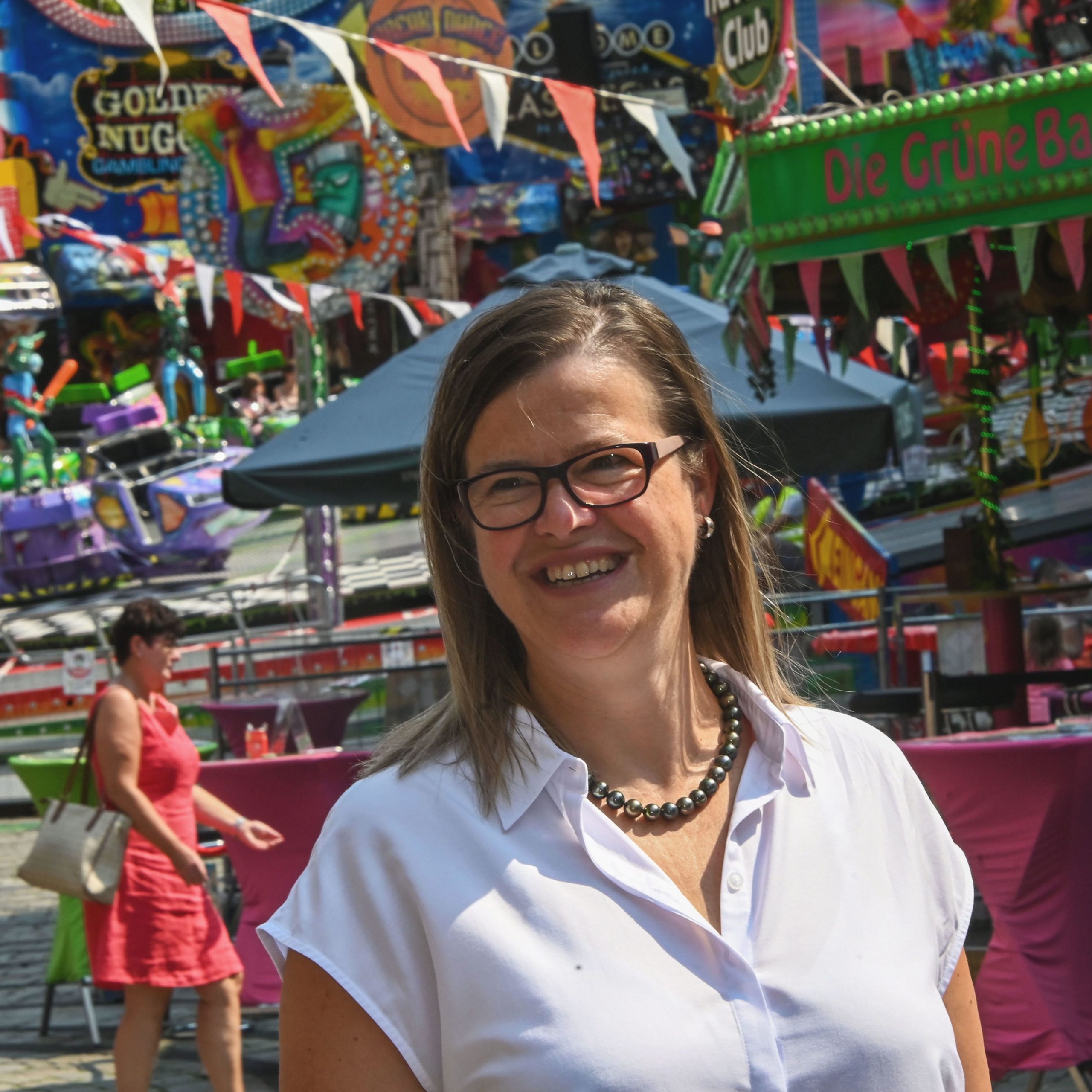
“New perspectives, crossover formats, networking – bringing together what didn’t belong together before, that’s what energizes and drives me. For over 25 years for the showmen’s association, as a Nürnberg resident for 60 years! What keeps me fit? Meeting new people, discovering new topics, concocting new ideas where at first people often say, You’re crazy! But isn’t it the crazy ideas that move us ahead: trying things out, exploring limits? A fair with showmen and rides at the Nürnberg Allerheiligsten would have been unthinkable until a few weeks ago, but it’s part of our life, our job, to be able to deal with situations flexibly, to be versatile, to remain creative and to take advantage of opportunities. And for all the damage it does to us, the crisis also gives us opportunities for growth. Critics? There are always critics. That’s okay; there should be critics. What I don’t like is envy. Of course, I am in the privileged position of being able to mix my job and personal life in such an enriching way, a chance to approach unknown topics – but everyone is free to get involved in new formats, to find out whether they can find access and see what the city has to offer them. And hey, the city really has a lot to offer, and the fair business, with its 1000-year-old tradition, is an important cultural asset that you can’t just let fall apart. Every social unit can only function through the unifying common ground, so why not search for it, explore, try – be more daring? Within the city administration, where the bureaucracy has increased more and more in recent years, it works just fine, they’re very accommodating; with new solutions and creativity that I hope will stay. We’ll never please everyone. But if everyone contributed just a little, everything would be so easy.”
Instagram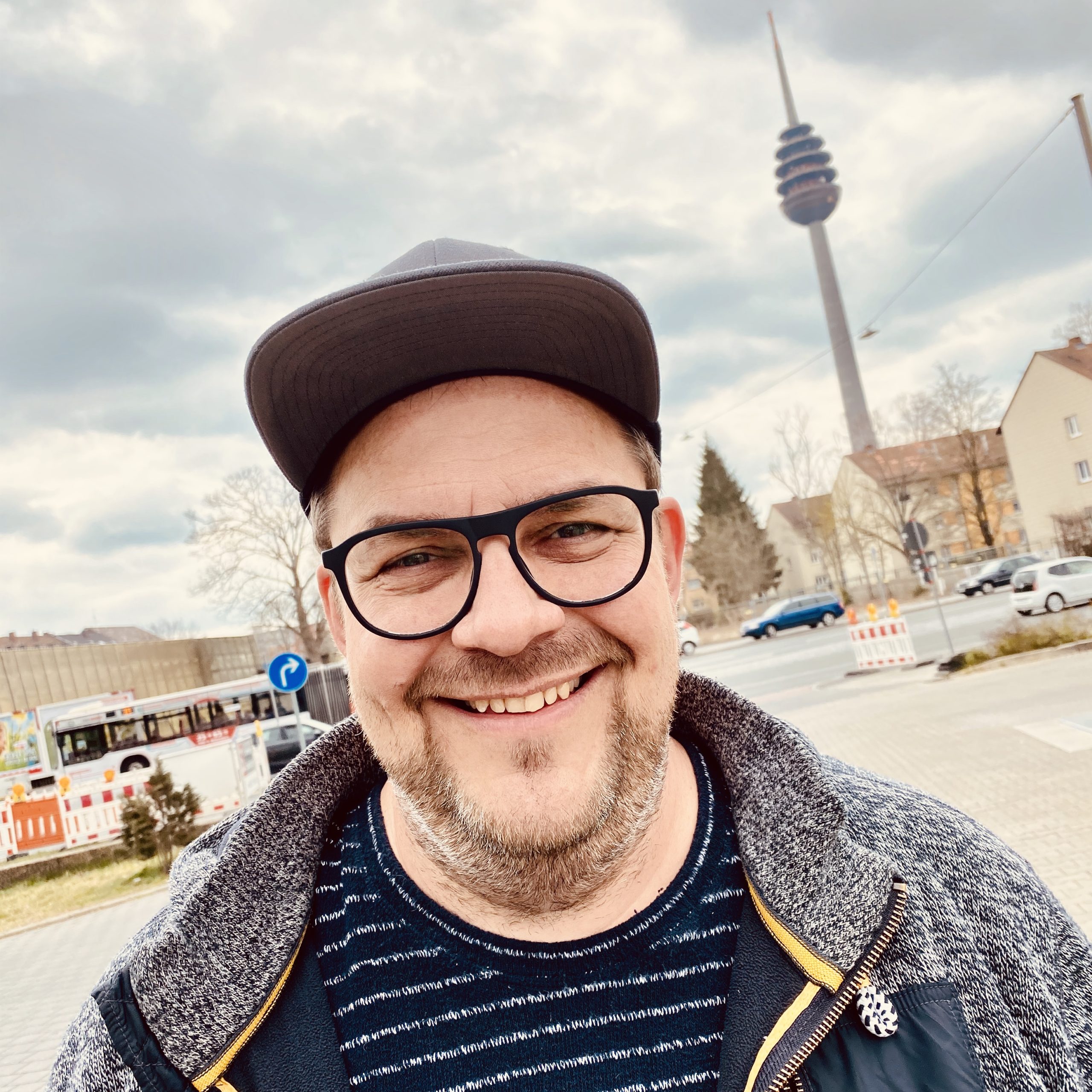
“There are a few places in Nürnberg that I miss. That cosy little Linde-stadium, for example, where we had drinks in the Strafbankstüberl during the EHC 80 Lumumba matches. The arena can’t compete with that. Or the demolished bridge over the Nordring: part of my bike route was to work up momentum before I reached the bridge, then to briefly dive into the dark and out into the light again. And I especially miss the panorama view – the one from the ‘Fernsehturm’. As a kid, I supervised its construction, so to speak. On the way to my grandparents from the Nordstadt to Gebersdorf we always went past it and so we could watch its construction ring by ring. Later I was up in the restaurant a few times – a unique atmosphere, which I hope will be regularly accessible again at some point (as soon as possible!) and, above all, more often than now, when it is open only once a year. Wouldn’t that be great for the European Capital of Culture? Nürnberg has long held a very different title: the Capital of Food Trucks! Ten years ago I launched RibWich, the first truck – the rest is history … I had actually largely withdrawn from my active business. I organized the SFC Street Food Convention in Nürnberg and Essen, but have orientated myself primarily as a mental coach, I’m writing a book and I’m on the move as a juice expert. But when my foodtruck colleagues were also existentially threatened with the onset of the coronavirus crisis, I did everything I could and created a delivery service together with my colleagues in two night shifts. Am I affected and worried myself? Affected, yes, for example if my trade fairs get cancelled. Worried, no. Life always goes on, maybe differently, but it goes on. You have to be adaptable and painless, then you’ll always find a way. ‘Nothing is more relaxing than accepting what is coming’ (Dalai Lama)”
Instagram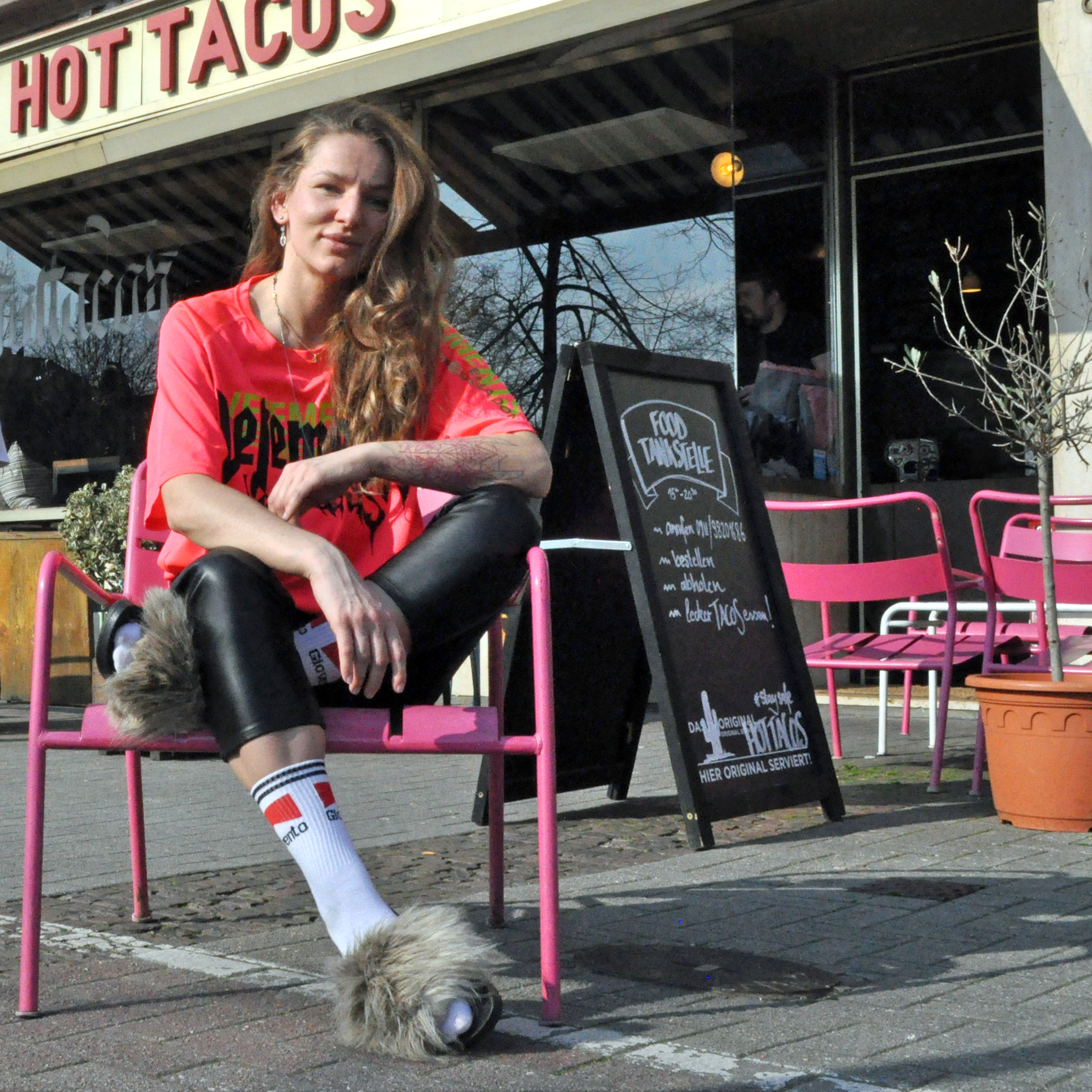
“Is ultimate tolerance something cool? I don’t know. In school, my classmates used to tease me, call me “nose” and “triangle head.” I didn’t care. I fought back. I had to fight back. Today, everything is wrapped up in wadding. Instagram is to blame for that too. People no longer have to deal with things directly. They have become externally formed beings. Do you remember when you were a child, when you had plasticine in different colours and didn’t want to mix them together because then everything becomes a brown mixture? That’s how it feels with Instagram. Undefined. Managers used to tell me: “You don’t need people” — but everybody needs people. There’s no point in cooking your own soup. It feels like Nuremberg isn’t evolving. But that’s not true. As a photographer I’ve been to Dubai, New York, Italy. If you go away for a few months and come back, you see how everything changes. Especially in Gostenhof. There used to be a grey cloud over the district. Today people walk along Fürther Straße like on a boardwalk. The harbour doesn’t feel like a city anymore. That is cool. Sometimes you could think that Berlin is a Franconian “refugee colony”. So many people who live there today come from Nuremberg.But especially they say: “Nuremberg is culturally crap”. That’s nonsense! These people grew up here. That shapes you. Nuremberg is in the middle of everything, has a good infrastructure and good accessibility. Berlin may be cool, has the style, that’s true. But it has to come from somewhere, right? For example, the Kolb, the pretzels — that is a cultural asset! My Berlin friends rave about them. That’s just one of many examples. If you can grumble about the city all the time, then something’s wrong with you — not with the city.”
Instagram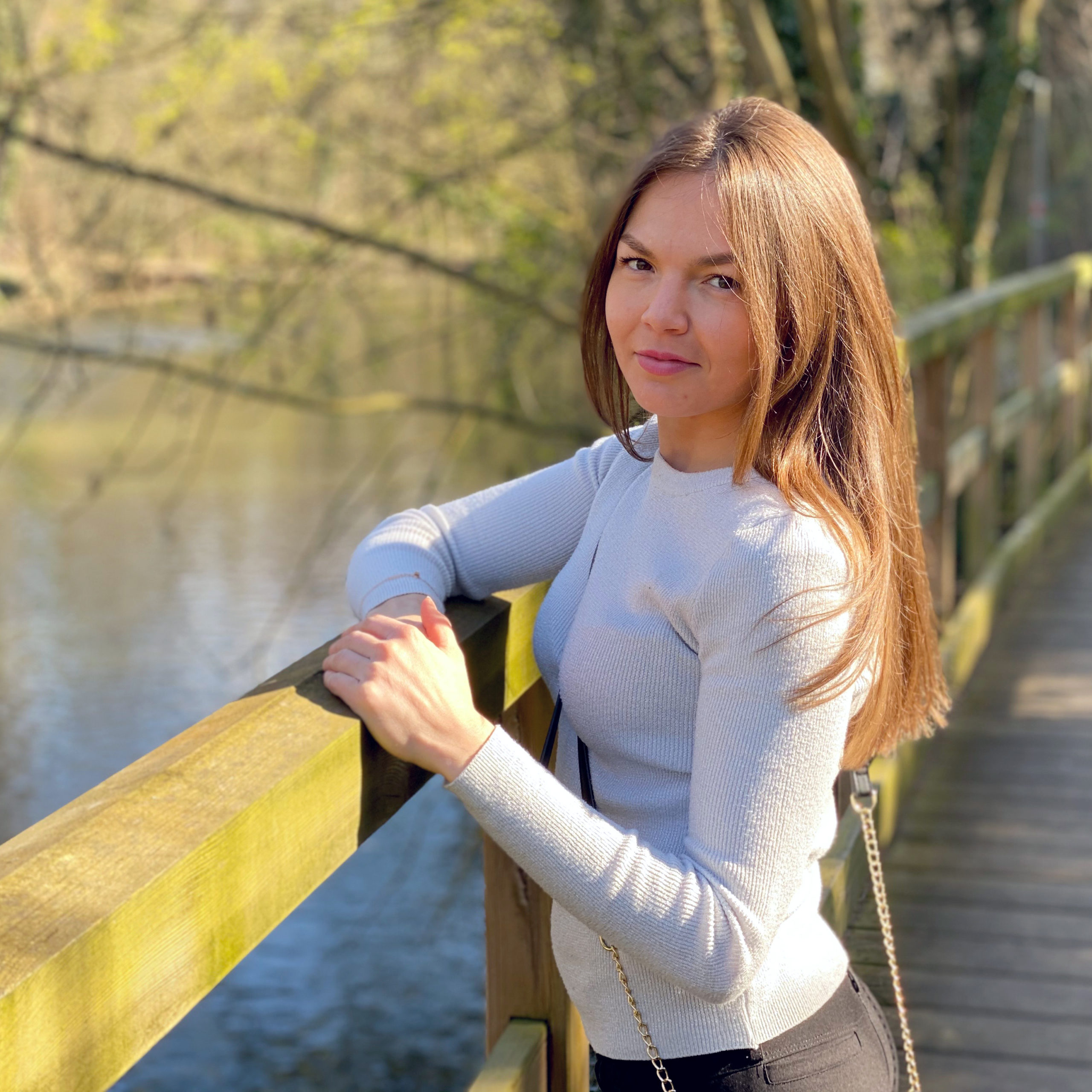
“Integration is a word that always sounds so vague to me, so intangible — what is it supposed to mean anyway? I am finally starting to realize through the importance of language. I am Russian and I had learned German in my hometown St. Petersburg, but coming here to Germany in 2016, I realized that speaking a language is something completely different from learning it. The first months were hard, I often thought to myself: Never mind, I’ll pack my bags now and go back. It was especially difficult at work since I studied tourism business in Russia, but my degree was not recognized here. On top of all this, there was the language barrier — that was a huge hurdle. Finally, the cultural differences between Nuremberg and St. Petersburg is noticeable in the smallest things. For example, in Russia, the bell plates don’t have a name on them, but a number — so that people can remain anonymous. Now, after three years, I can say: I made it. Nuremberg is very special, especially when it comes to culture and events. I always discover something extraordinary here. In summer: the “Blaue Nacht” and the “Bardentreffen” make me feel at home, even though I am surrounded by many strangers. At least, by now, I can talk to them without any problems. And I can see: Russia and Germany aren’t so different when it comes to the people.”
Instagram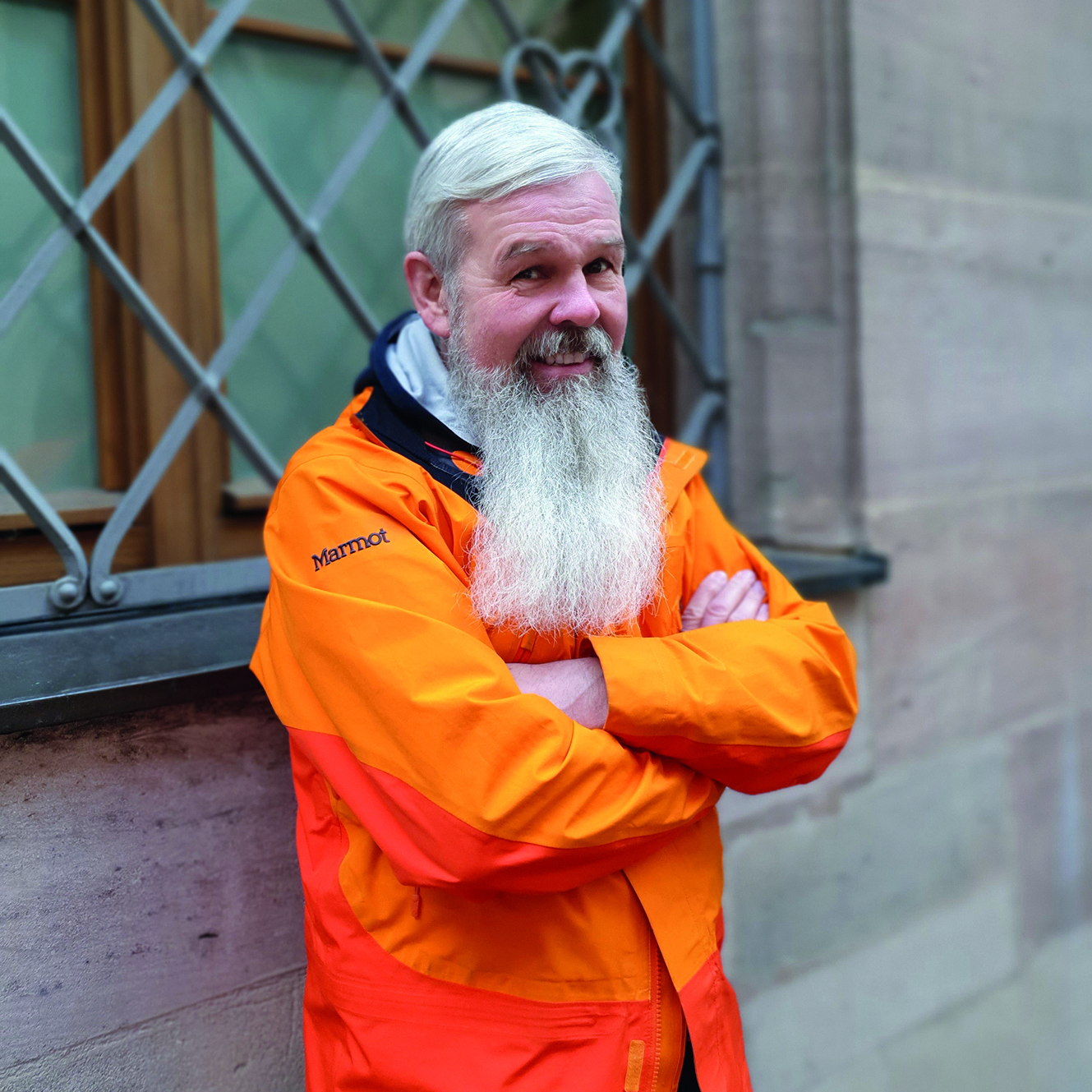
“As much as I’d like to, I sadly cannot give away my favourite place in Nürnberg – it’s so great mainly because hardly anyone knows about it for some reason. But I promise there are quite a few places in the city that may not be obvious at first, but are definitely worth discovering. All in all, after moving here from Weißenburg 40 years ago, I discovered Nürnberg for myself without any ambition to live anywhere else. It’s perfect for me just as a cyclist – well, because of the size of the city, not because of the conditions. And it’s high time that city planning paid attention to the cycle path network. Incidentally, that would be a more important aspect for the Capital of Culture bid than all the small-scale cultural developments. Because I have the idea, the desire that long-term developments emerging from the process could benefit the population. In terms of urban planning, for example, in the sense of housing: Why not call a competition for new architecture, perhaps in cooperation with the WBG? As the maker of the Straßenkreuzer CD, I have been dealing with the local music scene for 19 years and am happy about the sheer overwhelming numbers of good artists in the region, which has an almost endless pool of bands and musicians. The fact that Nürnberg isn’t a springboard to great careers is probably less due to the city than to the Franconian mentality, which likes to hide behind a sense of world modesty. But the same applies here as for the places in Nürnberg I mentioned at the beginning that you have to look for: They’re waiting to be discovered. Absolutely!”
Instagram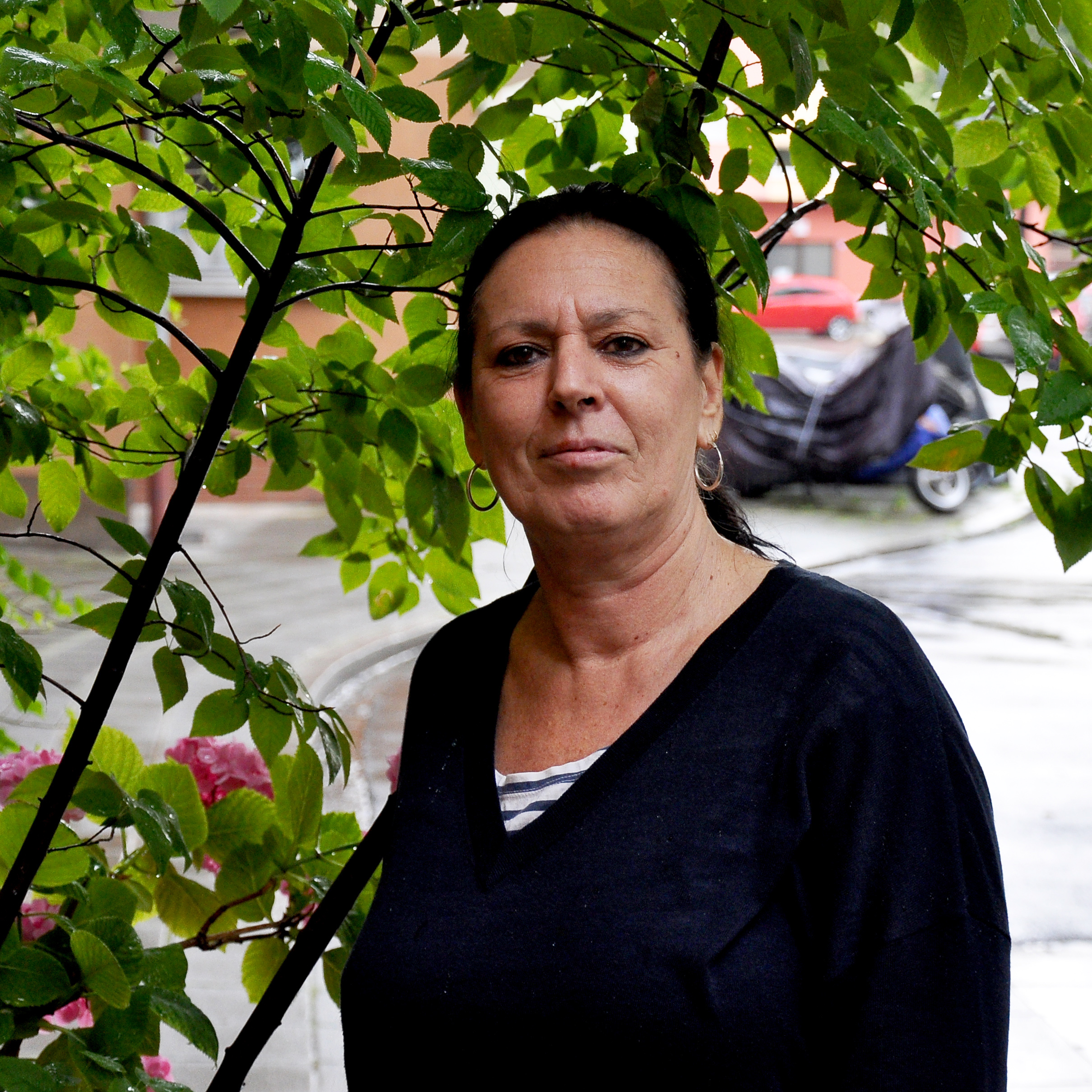
“I love to travel to war zones and at the same time I fear nothing more than death. For many people, these two aspects are incompatible. As a young woman, I was diagnosed with cancer. I barely had a chance to survive and despite that could fight the disease. After my recovery, one thing was clear to me: I want to travel and see the world! First, I went to India several times. I am fascinated by this colorful, positive country, where so many people live in poverty and yet are in good spirits. Since a few years I‘m travelling regularly to war zones. I traveled with nomads through Kurdistan, lived with war refugees in tent camps and lived together with the Yazidis army. Many times, I was under fire, outdoors and at home with friends I met on my journeys. My last trip took me to northern Syria in the Kurdish war zone. I always have my camera with me, but I do not shoot bloody corpses or soldiers. I am interested in the people, how they are families, maintain friendships, lead their lives and live their culture despite the devastating circumstances. I have met so many lovely and helpful people who survive in the most difficult circumstances, fear for their existence every day, yet smile, be courteous and openly share their stories. I also had exhibitions in Nuremberg with pictures of my experiences. But you only reach a certain group of people with these exhibitions. I would like to see art and culture in Nuremberg made more accessible to everyone in public space. My dream would be to realize a photo exhibition outdoors.”
Instagram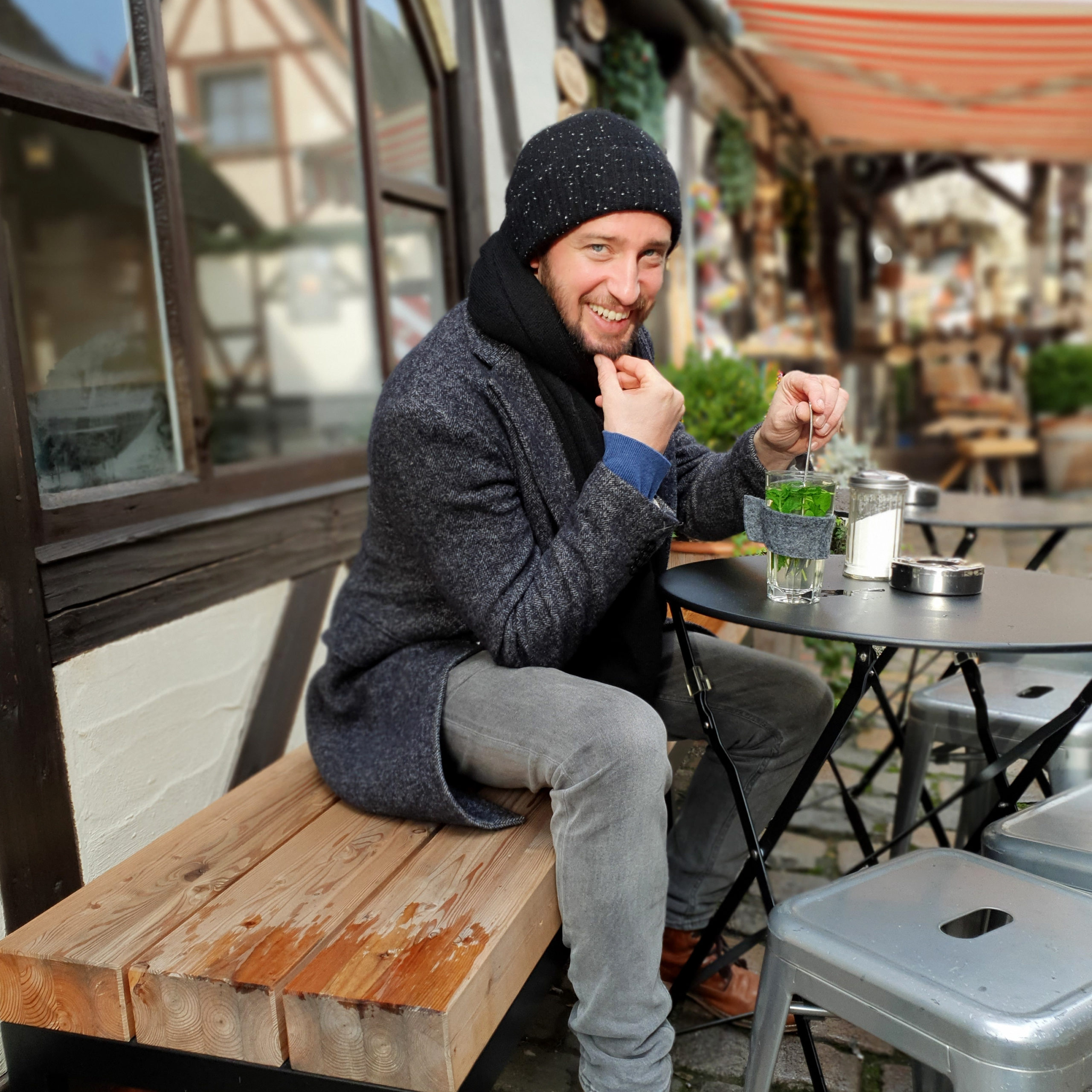
“Born in Fürth, I didn’t move to the big city of Nürnberg until I was 19. From there I moved to Munich – and returned quickly. Because there, I missed everything that makes Nürnberg special: It was too impersonal, too big… The charming thing here is that you can experience a lot of leisure activities, culture and history on foot within the old town wall, but the area around it is really growing, too. A lot is happening in districts like Eberhardshof, but also in the metropolitan region. Nürnberg is the centre of it all, it’s economically and culturally superb and an institution where a lot’s happening – regardless of the brewery density. With Bamberg, Bayreuth or Schwabach, I have nothing but beautiful cities less than an hour away, even little Wendelstein has a lot to offer. I myself live on the outskirts, almost in the country, in a village community with a functioning infrastructure. If I want to experience something different, I get on the bus and can be anywhere in 20 minutes and my three children are growing up safely. We don’t lack anything here. Fear isn’t a big issue here, but people often turn out to be not very cosmopolitan; it would be fantastic if they could open up more to other cultures and accept their way of life, unlike you’d expect often grumpy Franconians to do. I think the attempt to put in a bid as European Capital of Culture is justified, the potential is here – but there are other calibres, so I think the bid is a very brave move. But, well – there’s always something to complain about. I still don’t want to live anywhere else.”
Instagram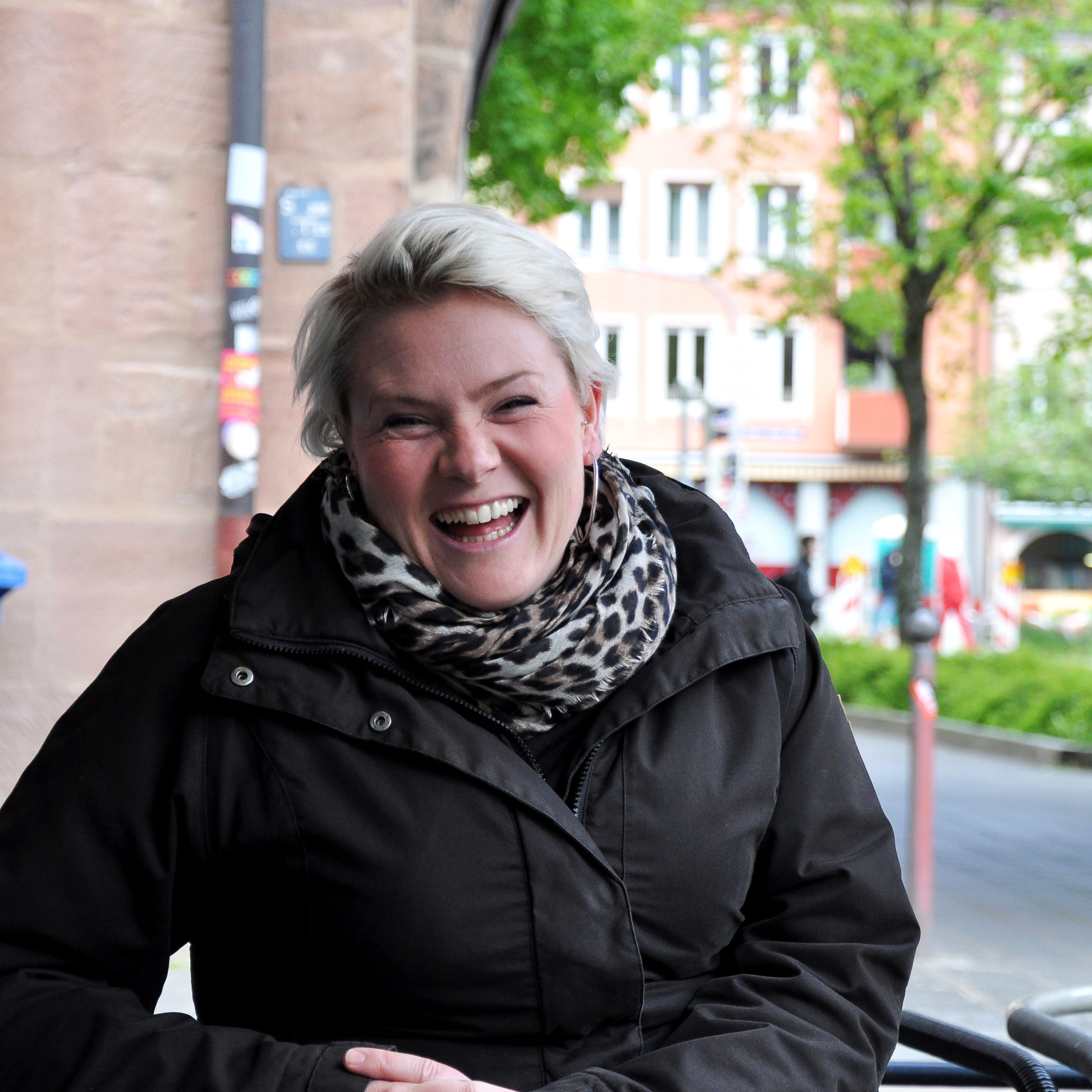
“Of course, like many young people, I was drawn to Berlin 15 years ago – It was the place to be. From my visits with friends, I‘ve gained the experience and knowlegde, that with certainty, I do not want to live there. In Berlin you just live in your little neighborhood. Here in Nuremberg, the whole city is my neighborhood. The advantage of Nuremberg is, that I have the cultural program of a whole city — and it is incredibly diverse. It upsets me when people say, with their old fashioned mentality, nothing is going on here in Nuremberg! Open your eyes, ears, nose, get out of your comfort zone, and explore! Certainly, people engaged in the cultural sector often have a hard time getting attention and recognition for their work. And I hope that as a cultural journalist, I can at least put projects or people in the spotlight. To all creative people who stay here despite of adversities, having the courage and wit: Respect! As an editor at the social magazine Straßenkreuzer, my view has sharpened even further in the last couple of years, especially my political point of view. The artist, who is poor and drinks wine every day at the same counter, is somehow cool because he is an artist. But we look in contempt at the person who sits always on the same bench and drinks his canned beer. Why is that so? My job forces me to often look beyond my own box, to embark in other cultures and realities of life — and in almost every case I happily come back from the trip. I can only recommend this trip. Opening yourself to new things is good for you and for the city, because the city is only as good as you make it. Culture is waiting on every corner, you just have to say hello. Be curious! Nuremberg is so much more than bratwurst, brown, and castle!” .
Instagram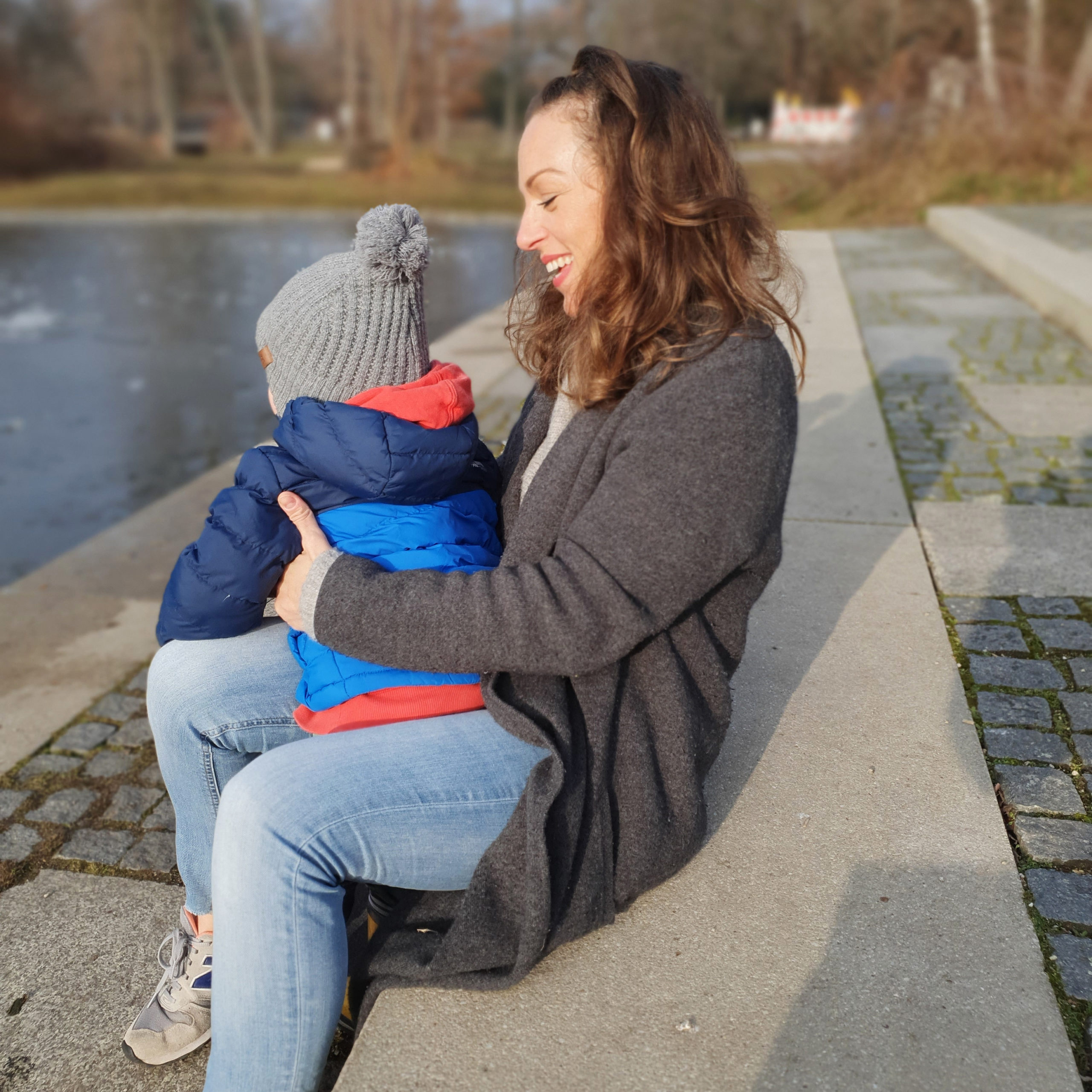
“I didn’t realise that I grew up in a neighbourhood that the whole city called a ‘ghetto’ until much, much later. I had a great childhood. My mother left my sister and me to play outside unsupervised, there was a lot of green, we were often in the nearby forest, we also always met in the neighbourhood as teenagers to hang out there – and then at some point I heard people say: You live in Langwasser with the lowlifes? I didn’t understand what that meant, I wasn’t aware of it. For me it was just nice there. But it was also nice after my apprenticeship when I had the first flat of my own – right in the middle of the old town. What I’d only known from short weekend trips has suddenly taken on more shape and colour. And apart from the fact I finally had everything on my doorstep at the prime partying age, I only then discovered how diverse the city’s cultural programme is – and I can well remember the first Blue Night that we visited on inline skates back then. Today I have two very young children myself; of course I want to give them the best possible childhood. But that’s easy in Nürnberg, especially here, where I have the park and Marienberg right on my doorstep. I wouldn’t dare send the children there to play alone like my mother did in the day. You’re so afraid that something could happen. But I don’t think it’s become more dangerous in the city – there’s simply a lot more reported on. The kids are really tying me up right now, but they’re also forcing me to open up, for example for conversations with seniors we’ve never met from the retirement home. That’s good. Until they’re big enough that we can take them with us for the great cultural offer for the little ones, we just take them to creative and music courses. And by the way, nobody’s said for a long time that I come from a ghetto.”
Instagram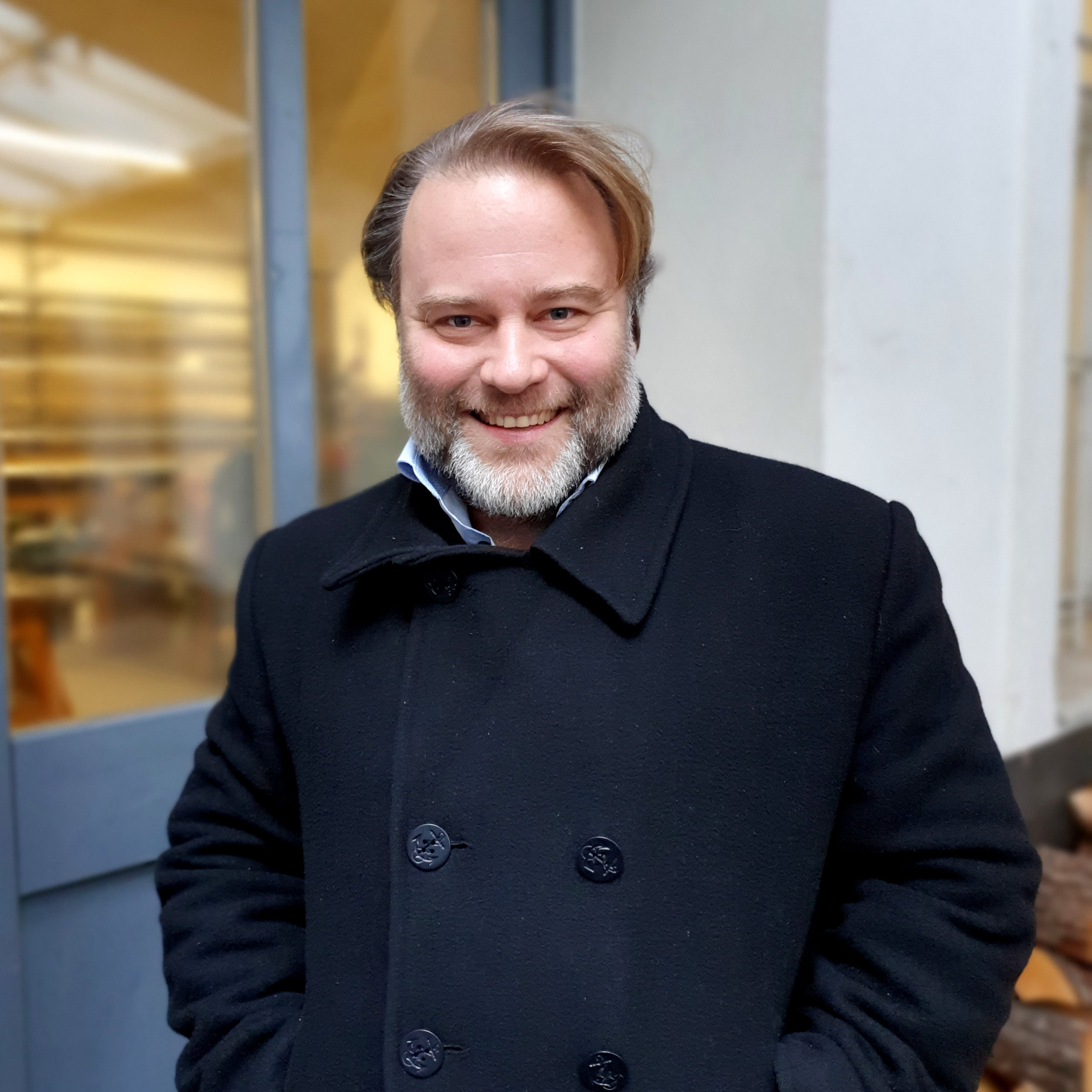
“I’m a born Stuttgarter who happily ended up in Nürnberg’s open arms. (After working for many years in theatre, I’m now working as acoach and consultant with my passion, the effect in various contexts.) I live with my family in the castle district, in the middle of a postcard paradise. It’s wonderful, but also a nuisance, because this beautiful cityscape is increasingly being flooded by bus and ferry and other tourists. Of course we need tourism, but, say, 10,000 special permits to the old town for incoming coaches per year are simply too many. I guess I have to deal with that – until the city empties in the evening and reveals its atmospheric beauty. While the castle district only gets quiet in the evening, right here in the centre of history there is a place where hardly anyone other than an occasional walker ends up: The Schnepperschützen or crossbowmen’s association, founded in 1506, once held the last line of defense in the castle gardens against enemy attacks – and today holds 13 beautiful little gardens. Everyone knows these gems, but hardly anyone knows what they’re all about. There’s neither a secret order behind it, nor are they allotments, but an association whose members are increasingly young families who are interested in preserving tradition. What it looks like? We meet four times a year and shoot with old crossbows at sawn-out wooden eagles and glass balls – a lot of fun! And it’s an incomparable atmosphere of history as well as for storytelling. For me and my family, our garden is a little piece of paradise in the shadow of the castle. When Nürnbergers hear the word ‘tradition,’ they immediately think of dark times instead of bright ones, but this wasn’t always just the city of the bad guys. As the association of crossbowmen, we try to preserve this older piece of culture and nature, this treasure, and in doing so, we help shape Nürnberg a little bit – quite close to the heart of the city.”
Instagram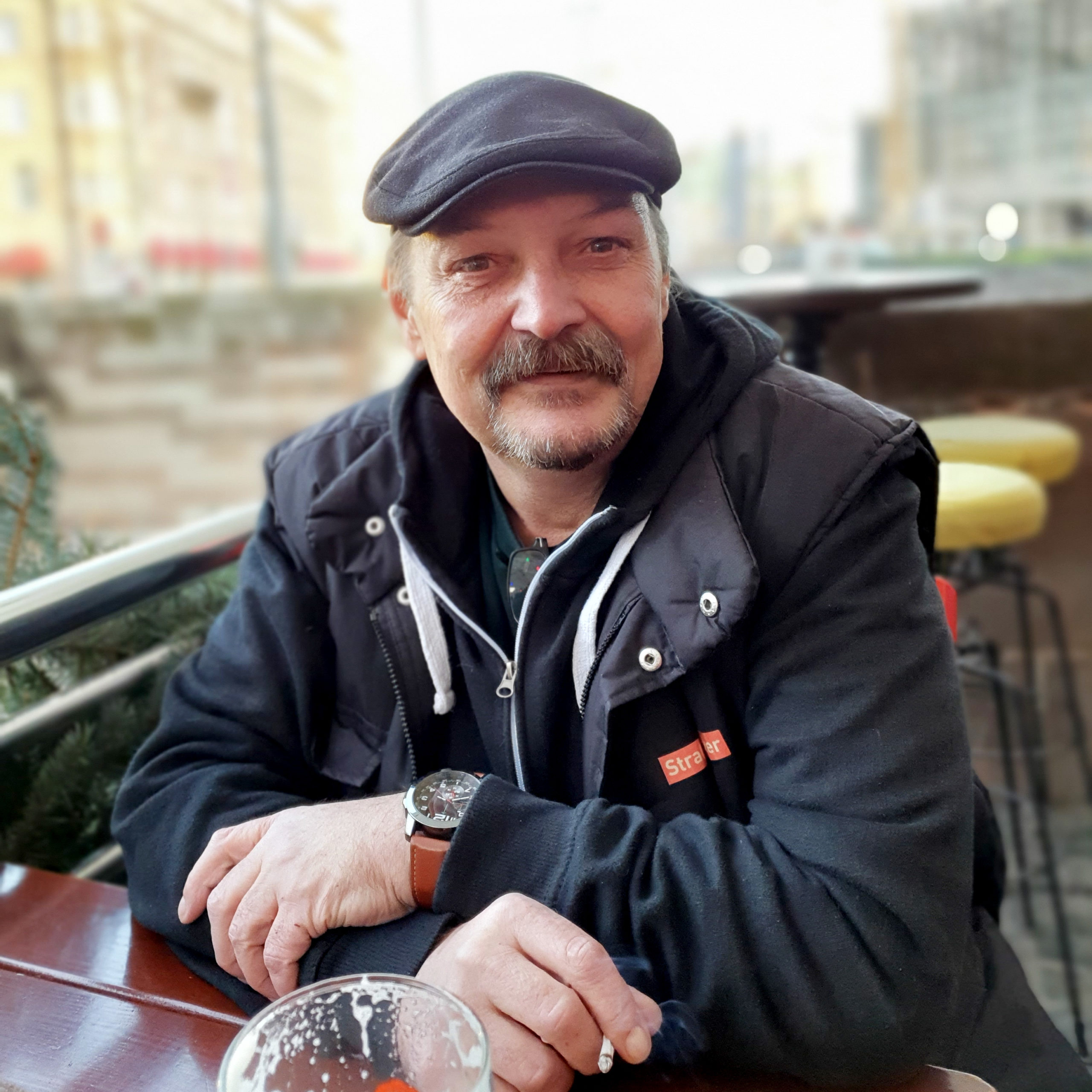
“I lived on the street as a homeless person for many years, I know Nürnberg from the very bottom, and I have to say, the people are really big-headed, look down on you or don’t look at you at all. They don’t think about how quickly they themselves could end up in the gutter. I worked for a long time, earned good money, then life broke my neck. I now have a flat, a job – and I feel rich. In experience. On the one hand, I learned how important it is to open your eyes to other lifestyles, other cultures, to try things before prejudging. Always look first and then form an opinion. That would be good for a lot of people here, and even if I can’t identify myself with a topic – hey, maybe you’ll meet someone you could help with your knowledge? When I landed on the street here, it was difficult at first to find out how I could get help: information isn’t shared readily because of the competition, and the city’s information policy isn’t emphasised enough. That said, the city’s aid programme is really good, Nürnberg is well positioned with regard to social institutions, even if it’s sad that they’re needed at all. We also have a lot of good programmes here for people who have little or no money, giving access to all kinds of cultural events with the Nürnberg-Pass. But for me, culture is more than art. Culture is urban society and living together, a respectful coexistence with everyone instead of with reservations, and I often miss dialogue here. What’s a real problem for me? The way people in need are often accommodated. Some of the facilities that I know of don’t meet minimum hygienic standards, in my opinion, are neglected and bleak. How can a person get back on his feet, how can he even think about it if he has to live like this? I’m not surprised that they try to beam away as much as possible throughout the day. Shelter has to be fit for human habitation.”
Instagram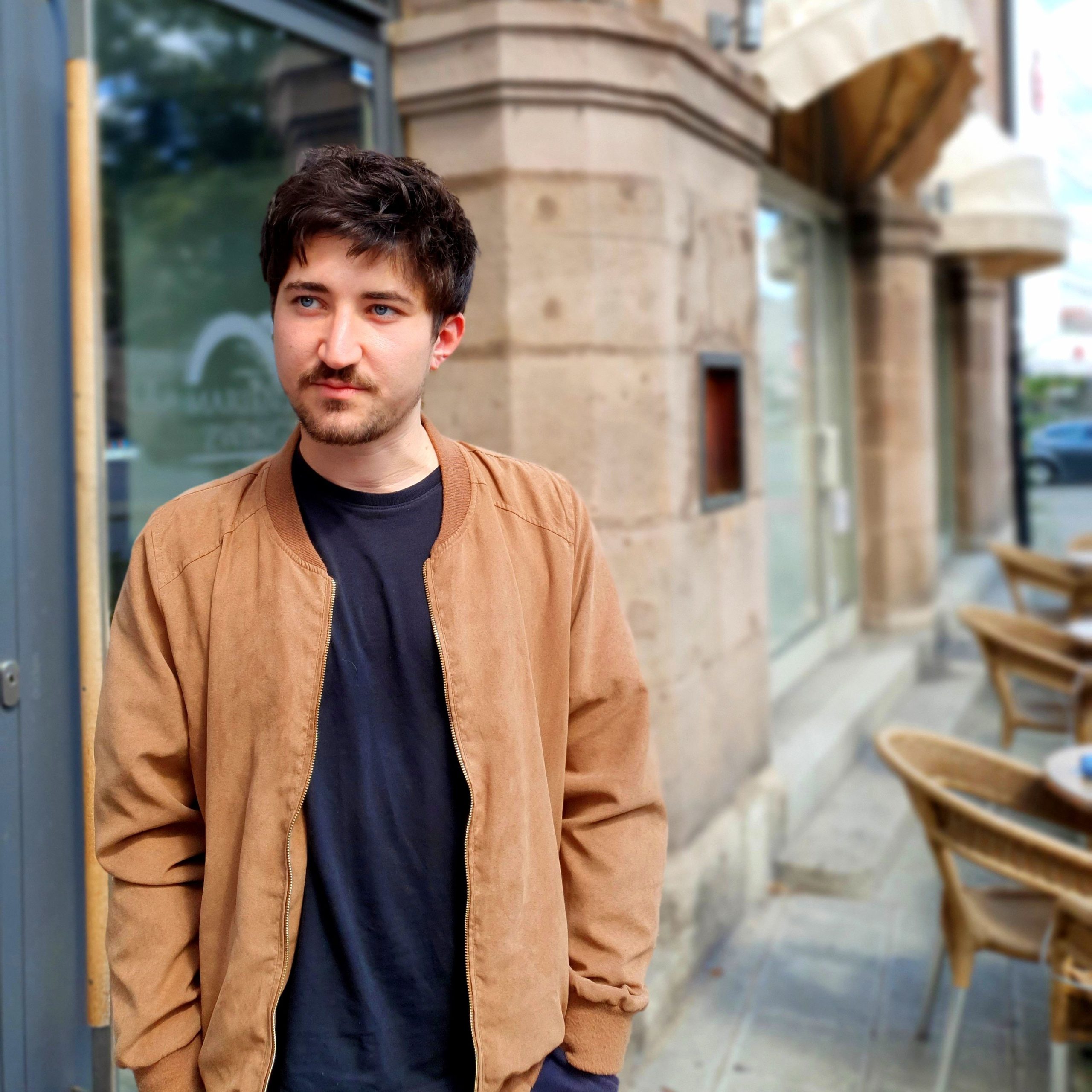
“Space to be creative, active house projects, endless creative growth opportunities – during one and a half years in Dresden, I learned why artists from Nürnberg move there and not the other way around. I couldn’t say that creatives from elsewhere move here because things do so well here, they can develop their skills and test themselves here. As a result, the successful artists or musicians don’t come from here, but from Cologne, Leipzig or Berlin. Nürnberg actually has incredible potential in people who could be incentivized to stay here with just a fertile cultural landscape. I came back myself because I am deeply rooted here, but I brought along inspiration and I’m always trying to get things rolling: as an organizer, as a musician with “We Brought a Penguin”, as an initiative with the KollektivKollektiv, now also politically as part of the Politbande, whose representation on the city council shows us the incredible numbers of things that can be done instead of just watching and grumbling on the sidelines. All of the parties are looking for contact, for conversations – you just have to see where it leads, and of course they all pursue their own political goals, but we feel that we’re being taken seriously, well received. Finally, the interests of the subculture can be positioned in the proper places and right now we are actually moving something with the ‘Kulturoase’. I myself had to learn that you have to get off your butt and stick with it; but the results are simply brilliant. I’m definitely hoping we get the title of Capital of Culture because it’s not an award but a means of promotion. As it is now, the city would certainly not have deserved the title. What we’re already seeing, however, is that the bid process is opening up a dialogue that, I think, would not otherwise have existed; at least a willingness to listen to the subculture, even if we have to admit that there aren’t many results yet. But I see how many people are working on it. It will happen!”
Instagram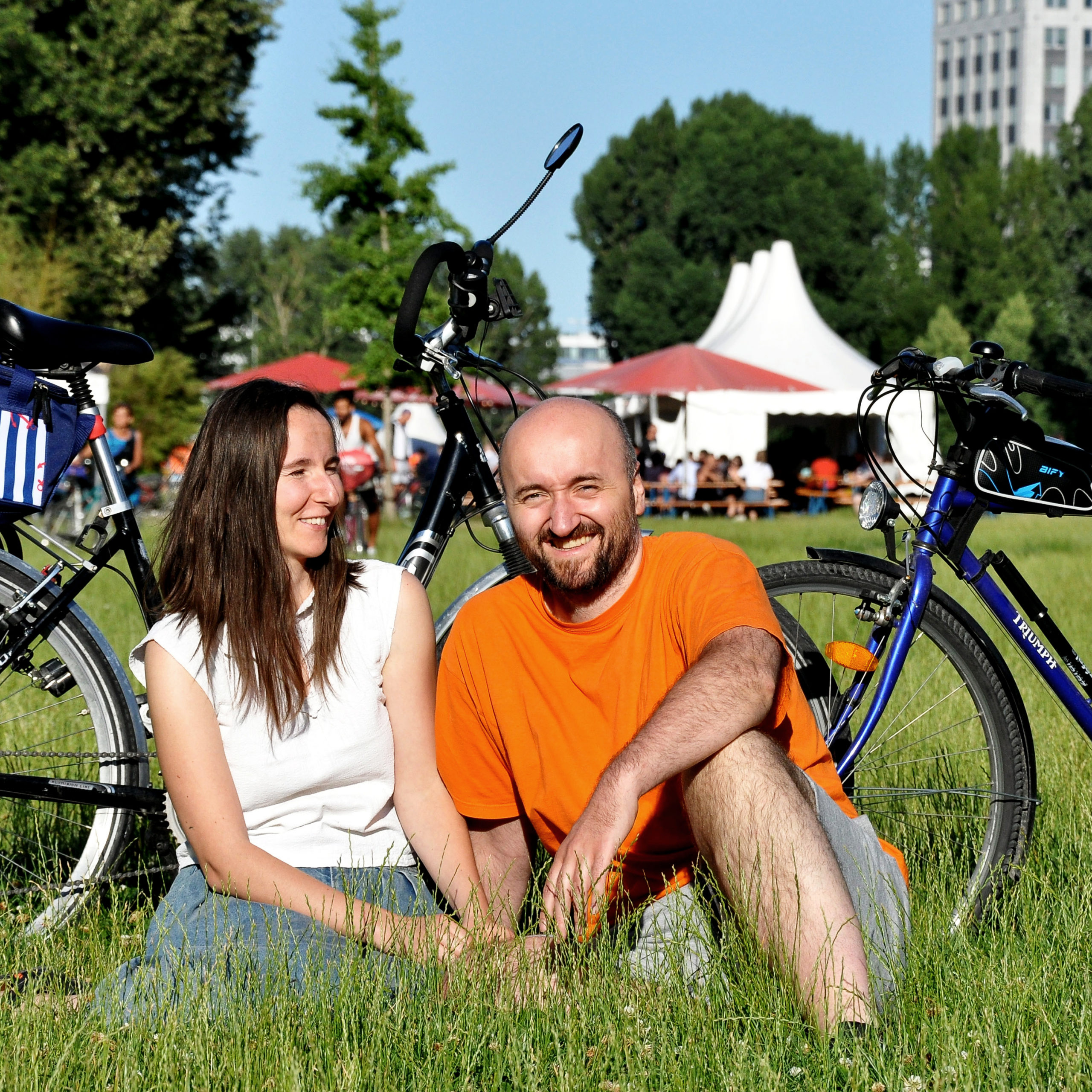
“We decided, we wanted to see, if there is anything else out there. We wanted to explore a new culture, therefore we were looking for jobs in Austria and Germany. When Branko found a job in Nuremberg, our decision was made. We both work in the IT sector, so it was not so hard to find a job and get along, as everything is in English. For us it is always interesting to see different cultures, to meet different people and learn new things. We came from Banja Luka in Bosnia and Herzegovina to Nuremberg in February. What we love about Nuremberg is that we can go almost anywhere by bike, that’s excellent. We visit our family and friends every couple of weeks, back at home, thus we don’t get homesick. But we would like to build our own community here too. We can’t wait to improve our German-skills. In our opinion it is very important to speak the language to integrate here. It is not ok to expect, that you can do everything in English here. We love spending time in nature after work and visit the many parks in Nuremberg, as the city is very green. Sometimes we go to concerts which we hear about in Curt Magazin . We wish that everyone would have this possibility. We hope that one day, all people are free to travel and live wherever they want to, and that walls will fall and not rise again, especially in Europe. But not only the wisest are deciding, unfortunately. When we first came here, we didn’t know anything about Nuremberg, except the Nuremberg Trials. To be honest, we hoped it would be as we expected, and we discovered that it is. We really like it here and are very happy to be here. People are open and we get along very well. I’m very happy for one cliché being true: The beer here is much better than where we come from. But the “Schnaps” is better in Banja Luka.”
Instagram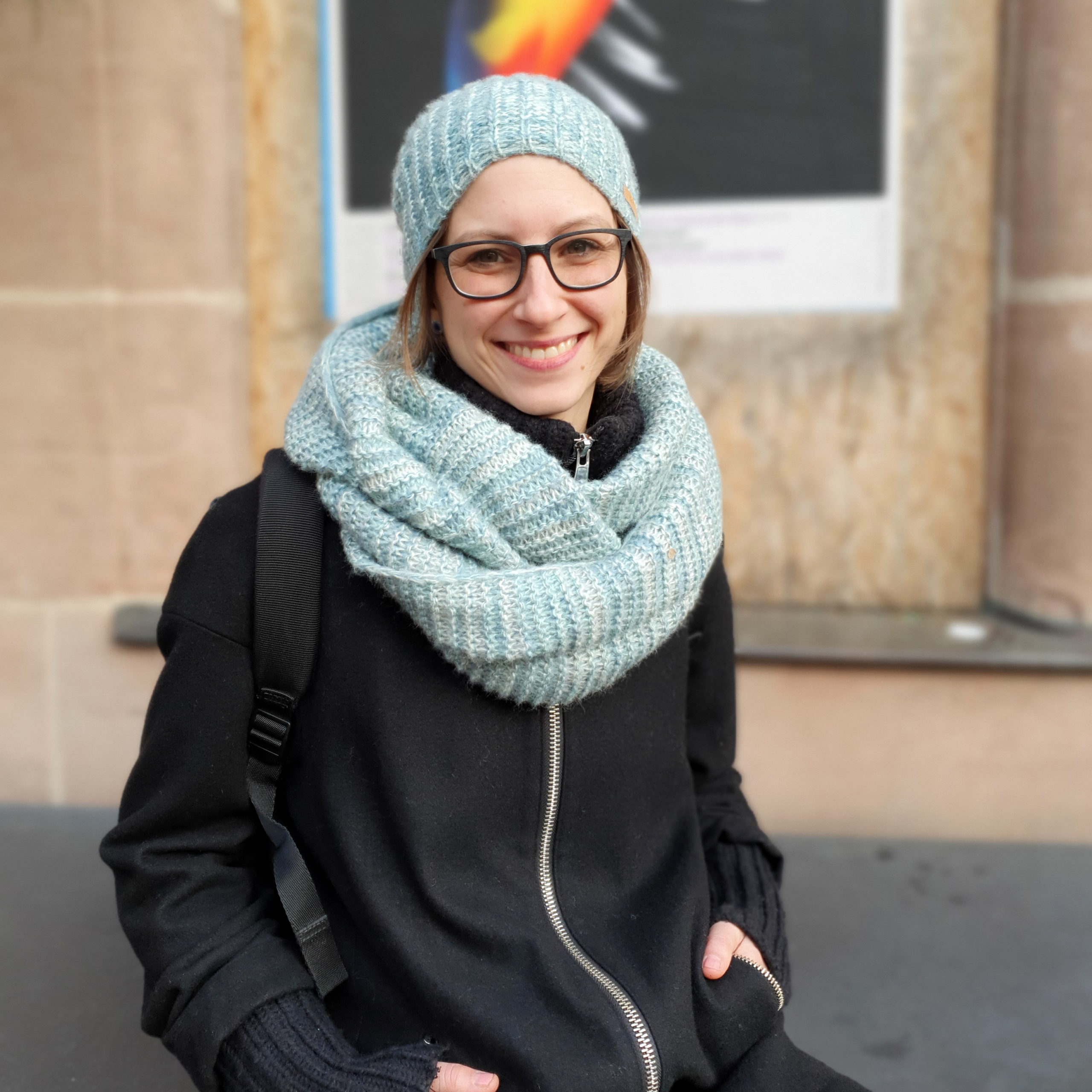
“What’s most important to me are the opportunities of a big network that Nürnberg offers. And not least because of its perfect size for making and maintaining lots of contacts. Here, I can observe projects, initiatives, people in their development for a long time and be a part of it. Because a huge amount of developments are going on, as demonstrated by the N2025 Open Call, which brought many slumbering ideas back to life. For me as a passionate cultural person, it’s important to be able to experience the cultural landscape in all its diversity and to discover the many cosmoses. On the one hand, I enjoy getting to know the actors behind the projects, and on the other hand, as the director of the Künstlerhaus Nürnberg , to act as a facilitator. And an awful lot is possible – but you have to talk about it, get together person-to-person, develop ideas, sometimes reject them and think again. With my project work, I try above all to support the independent initiatives, which I know have little funding. Finances are a problem, as is the lack of space. Some processes are long and drawn out, but I don’t think you can say that nothing works here. It’s a stereotype to speak of ‘the city’ in general as putting the brakes on culture. There are door openers in many places that open up opportunities and I hope that the public perceives that we are open to change processes and that some things are already moving. I experienced an important aspect of the cultural scene after the fire in the Kantine: the great solidarity, the citywide voluntary and full-time support that we experienced. It showed that the supposedly competitive situation can suddenly take a back seat and then there are only organisers who stick together. It’s these very connections that make it possible for us, during the present renovations of the Künstlerhaus, to maintain ongoing operations of the groups and associations based here at alternative locations. And isn’t it great what collaborations have already developed from it? For example, an app-supported live performance in St. Martha, punk in the Katharinensaal or a market for sustainable gifts at AEG.”
Instagram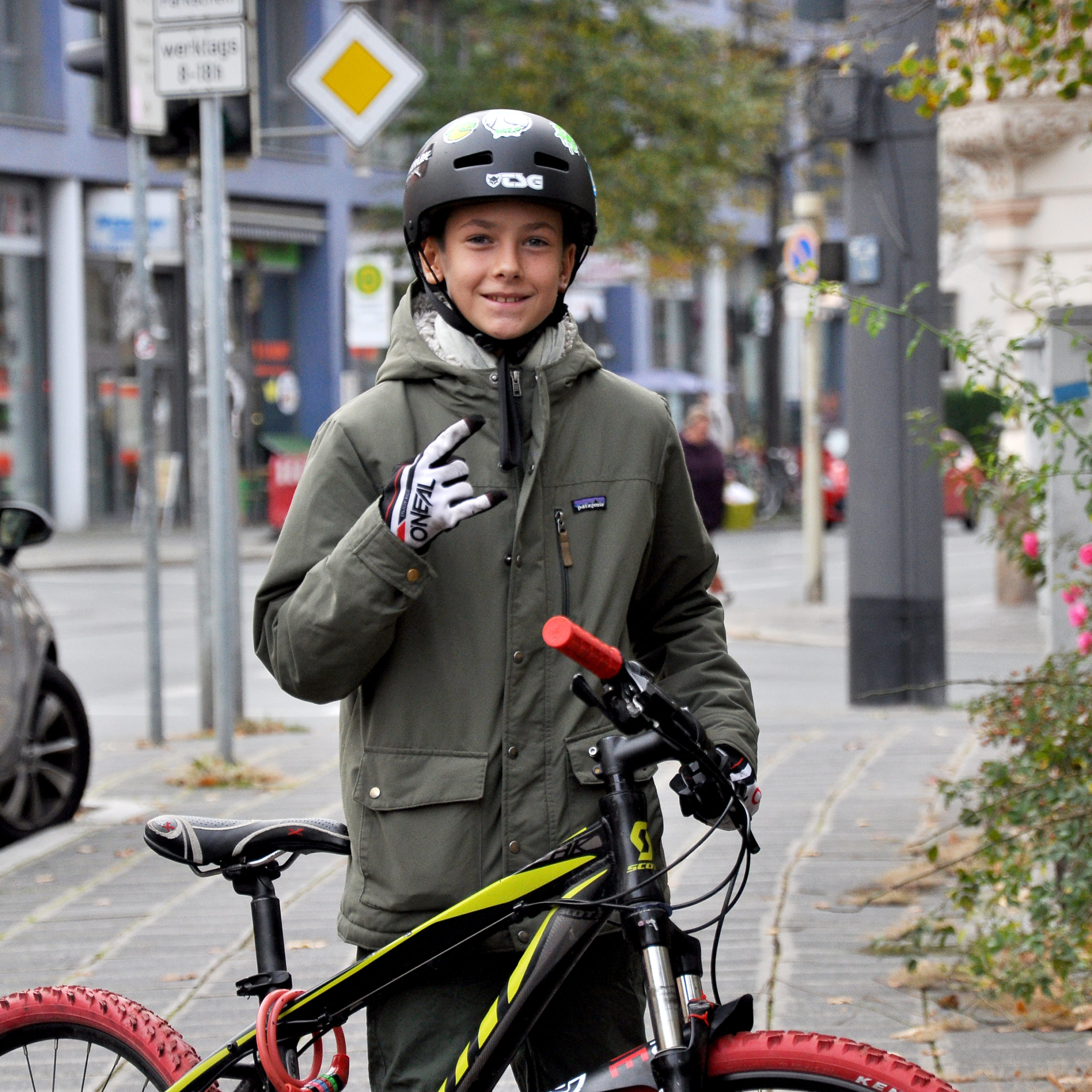
“It’s important to me that people do something for the environment. I’ve also been to a Fridays for Future demonstration in Nuremberg, and it was cool that everyone participated and peacefully demonstrated, so that the politicians finally do something. Many do not take the environmental issue seriously and make fun of it, but if we continue producing so much trash and emissions, it gets worse and worse with the garbage in the world. I love to go outside, I often go to the skatepark or ride my downhill bike at the Marienbergpark. When I’m skating and biking I always get a ’nice flow’, I enjoy it and loike to be out with my friends. I think it’s just a pity that there is only one real skate park with a halfpipe in the center of Nuremberg and it is often beleaguered by older teenagers who drink alcohol and smoke and have nothing to do with skateboarding. I do not always feel so good with my friends around there. With the skateboard you can only ride on asphalt and concrete and because I like to be in nature, I often ride on Marienberg with my downhill bike. Together with my friends I build ramps out of dirt and do different tricks. In Nuremberg there are strange people on every corner. For example, guys who drive with their great sports cars way too fast and almost hit people. I would like to see all people in Nuremberg become more attentive to the environment and their fellow human beings.”
Instagram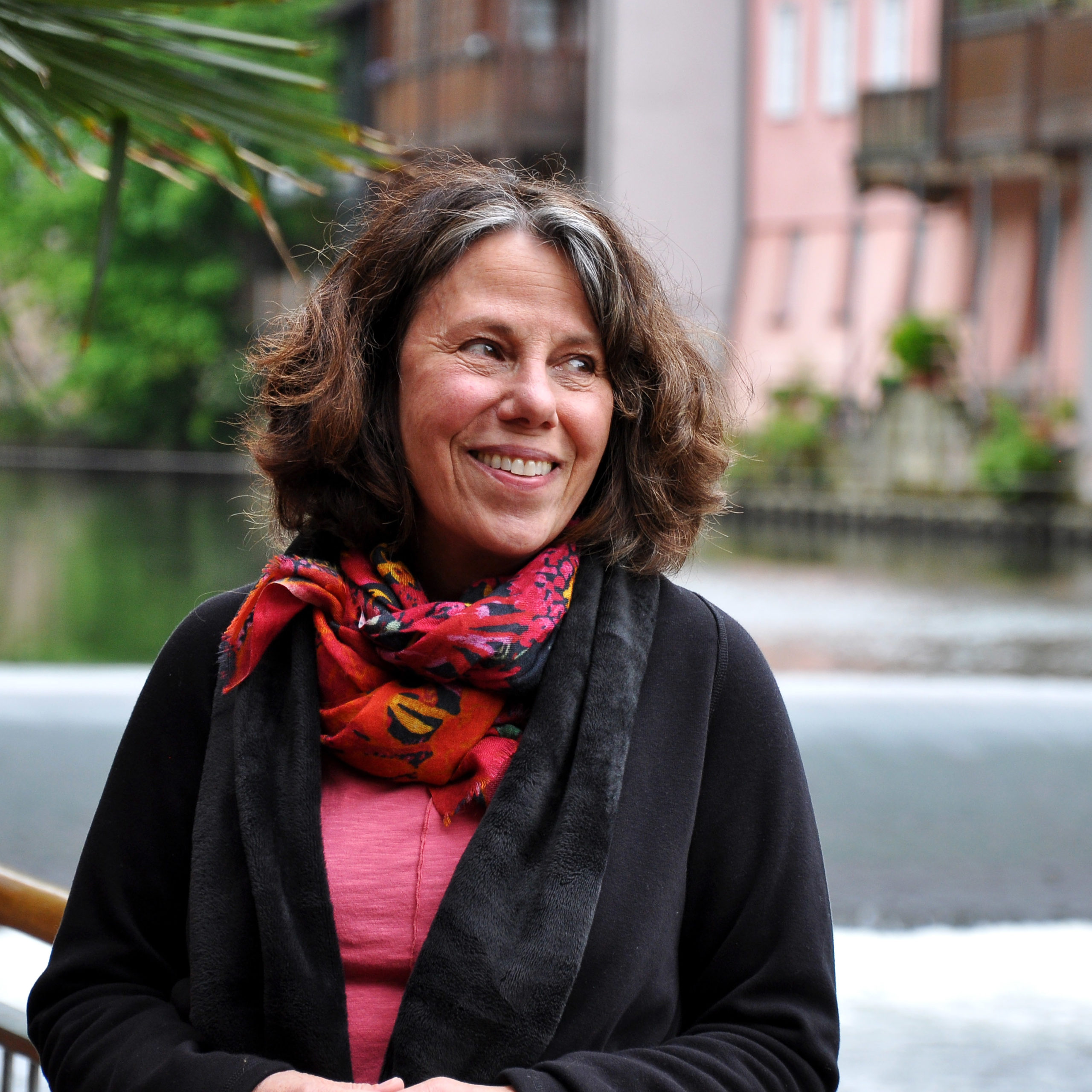
“I was working as a photographer in New York City and had had a very busy summer, so I went to Hawaii for a vacation, wanting just to relax by myself. While hiking through the beautiful nature on Maui, I bumped into this guy. With his red hair and beard he looked like Van Gogh. We talked a lot and made many trips together and started a long-distance relationship between Germany and America. We decided to live together and marry. As we were searching for places to live I found out I was pregnant. My husband‘s mother had recently died and so a house in Nuremberg was available for us. I didn’t like the idea of raising a baby in Manhattan, so we decided to go to Nuremberg temporarily in 1987. When I told friends and family about our plan, I was often greeted by shocked looks: how could I go there? The city of Nuremberg still had a pretty negative reputation in the US, and coming from a Jewish family, it did feel a bit weird. I did not like living in Germany at all. I found it very dead and the people closed. After we had our second child in 1991 we bought a house north of San Francisco and we were ready to move. Then 9/11 happened. I was grocery shopping when the news spread that New York City had been attacked. I tried to stay calm. I remember driving home from the store through Eibach, listening to breaking news on the radio while passing by the poor, stunted forest that surrounds the harbor, and it suddenly looked alive and beautiful. I began to see life here in a different light and began to question the values and life in America. I started having second thoughts about leaving. Especially in the last few years, Nuremberg has been changing. The society is less homogenous and with the change in generations there is more openness. Life here is more basic and stable, but I feel a lot more comfortable about that now. What I still love about America are the people. They are so open and friendly and easy to deal with. I would wish that for Nuremberg, too.”
Instagram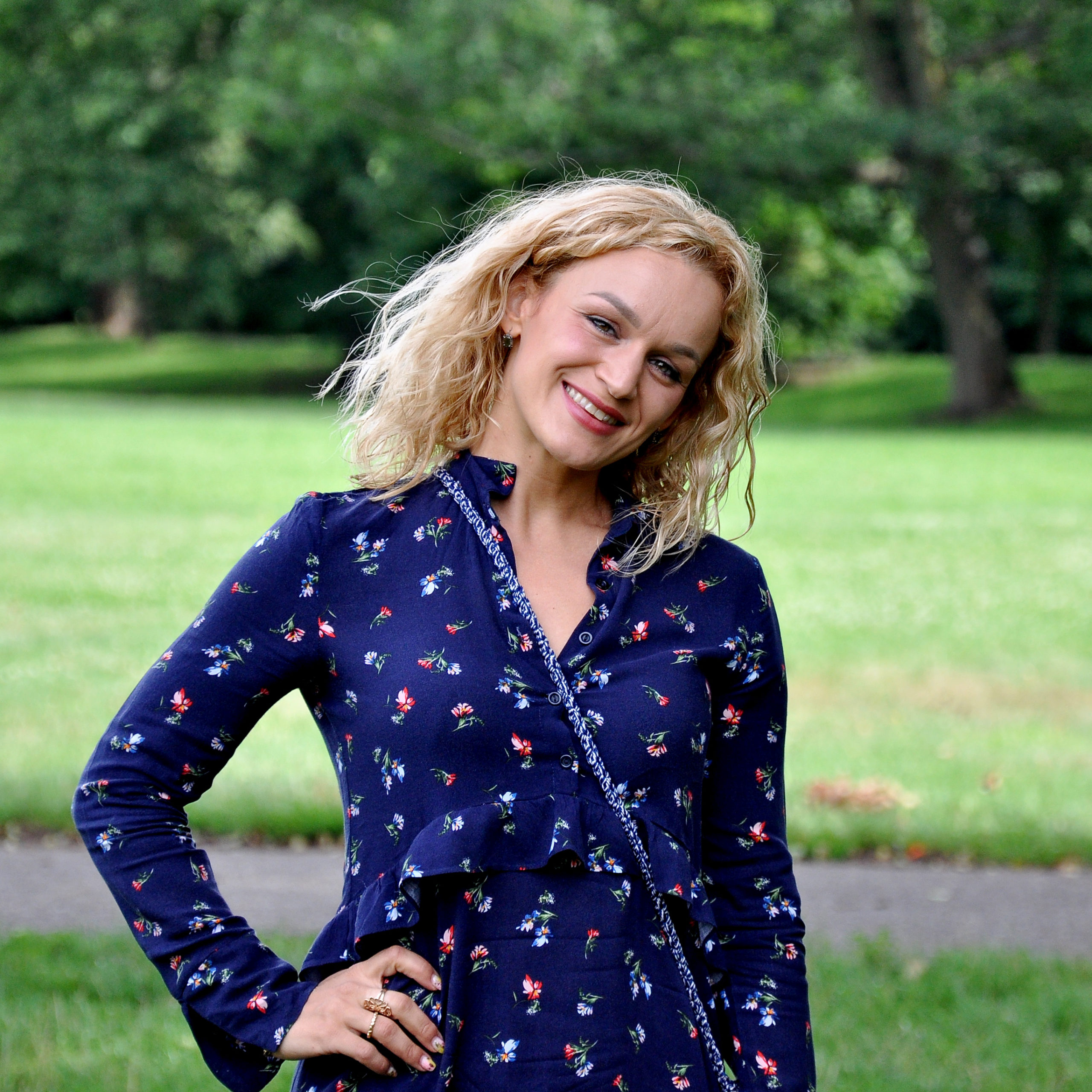
“As a teenager, I came to Germany with my parents from Ukraine. I did not like it here at first, I did not get along and did not feel like I belonged here. I did not know where to go, had no goal, no perspective. Then I found my love for sport. I started to run regularly and developed self-discipline and a sense of freedom. Just for fun, I signed up for a bodybuilding contest. I could not find a coach so I trained by myself for the competition. I was so surprised when I won in my weight class. I wanted to prove it to myself and did it! Today I try a lot of different sports, do Pilates and Yoga, still enjoy running and also train my own group of women regularly. Many of my course participants have been through hard times, fled their home countries and are partly new in Nuremberg. My courses not only connect us in sports, we listen to each other, help each other out and grow together into a community. At one of our meetings at Wöhrder Wiese, a group of women watched us. They wore kerchiefs and did not speak German. Carefully they approached our group and as we animated them with hands and feet to join in, the ice was broken quickly. They tried the exercises and everyone had a lot of fun in this encounter. I live as a woman with Polish and Ukrainian roots in Germany — today I do not feel torn anymore, but I create my very own identity and coach other women as an Integral Coach in seminars and individually. Sport can connect people, reduce inhibitions and prejudices and contribute to integration. It would be nice if there were more such offers. ”
Instagram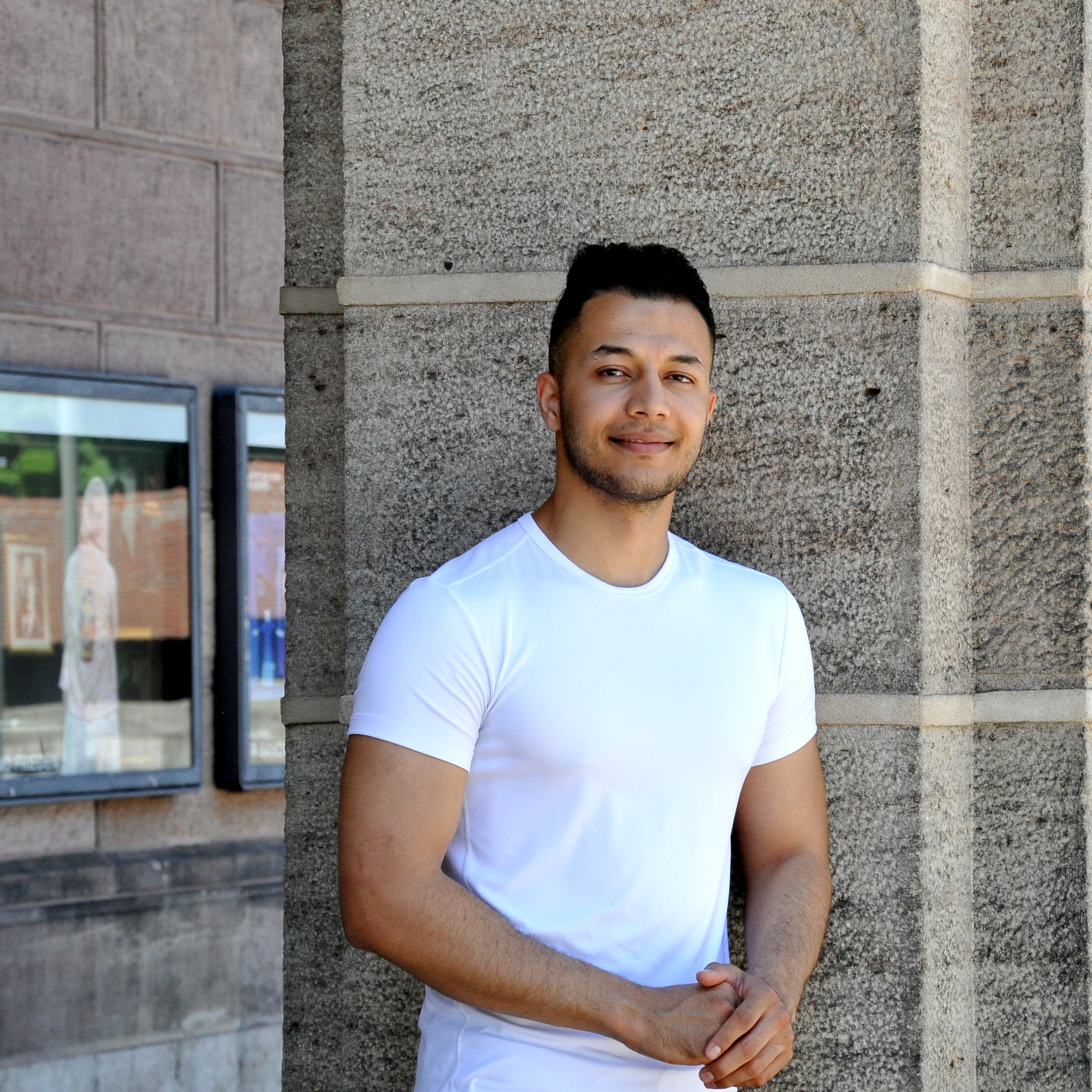
“One day, our father did not come home from work. He was missing for two weeks, we asked all friends and colleagues, no one knew where he was. Then suddenly he came home and told us we have to leave our beloved homeland Afghanistan immediately, because it is no longer safe for us. We left in the middle of the night, my mother, my father, my little brother and me. I was 16 years old at the time. We fled to Iran and eventually wanted to get from Turkey to Greece by boat. My brother and I took the first boat, my parents the second. However, their boat never arrived in Greece and so we brothers were on our own. Due to my good English skills, I was able to work as an interpreter and at least arranged a tent in the refugee camp. Others were not so lucky and had to sleep on the bare ground in the winter. We took a ferry to Athens and from there to Germany. An aunt, who has been living in Nuremberg for a few years now, awaited us here. In the past few years, my everyday life consisted only of school and studying. In the morning I went to class and then I continued to study late into the night. The hard work was worthwhile: in three years I‘ve learned German, graduated from school and I got my university-entrance diploma this summer. Now I have received the letter of acceptance of a large IT company in Nuremberg and start training as a qualified IT specialist. We came to Nuremberg with nothing more than our clothes on our backs, today my brother and I live in an apartment and have everything we need. My parents would be very proud. ”
Instagram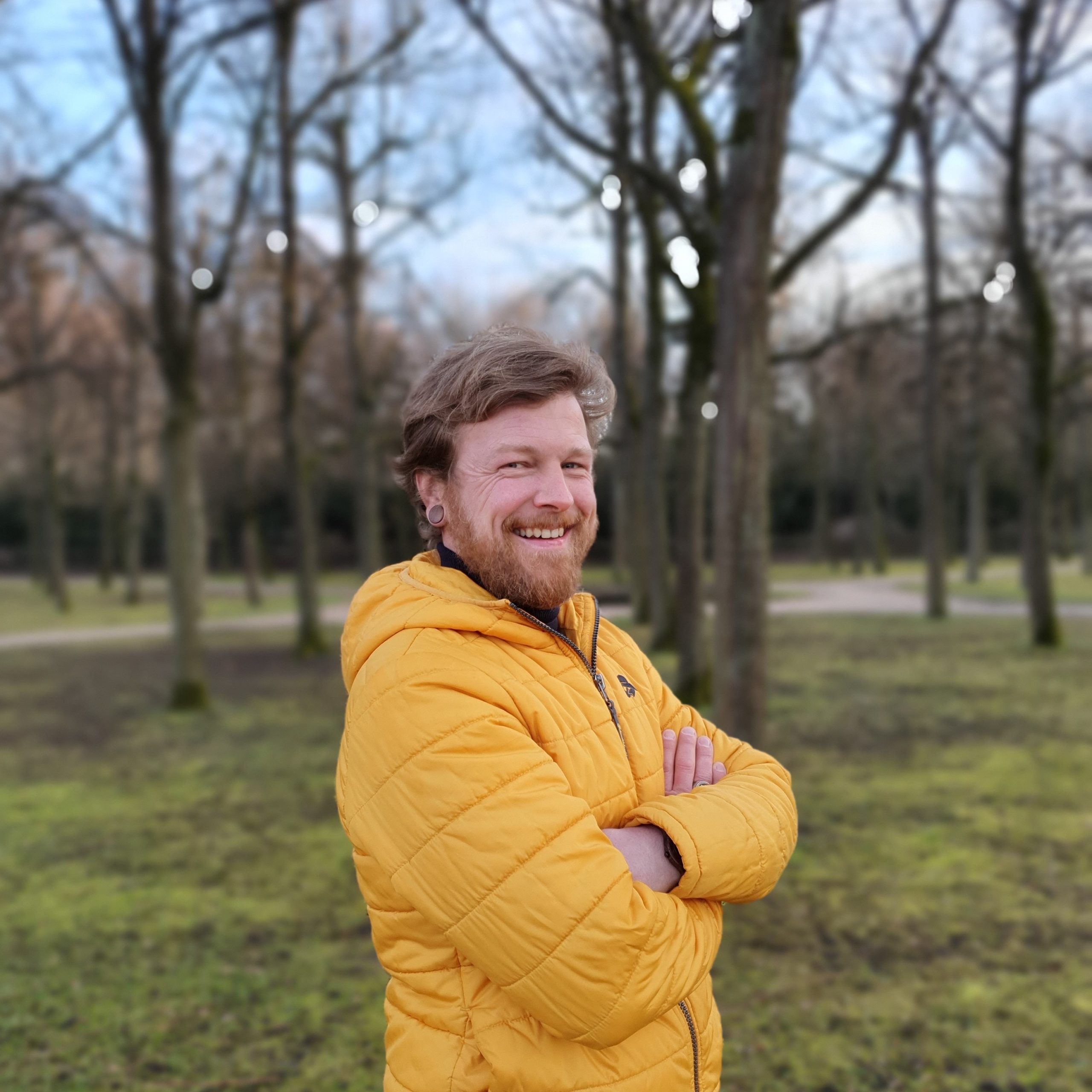
“My first years in Nürnberg? Constant surprises! Unfortunately, I have to say that coming from Bayreuth, I wasn’t spoiled by cultural events beyond the Wagner Festival, and I can’t even identify with that one major event – the rest of the city, or at least the decision-makers, apparently can. You’ll hardly find any small, self-administered subcultural spaces in Bayreuth, which is a mystery to me considering the countless students. So Nürnberg was a real discovery for me: events, spaces, styles, people … Always different, always new – and always done with so much love! It only gradually became clear to me that creative people still need something else besides passion. Lots of conversations, the opportunity to look behind the scenes, taught me how often many battles have to be fought, how hard it is for some initiatives to stay afloat, to juggle with small amounts of money – and how very much is borne exclusively by volunteers’ shoulders. I believe that many Nürnberg residents are not aware of that, that too few people move out of their comfort zone, out of consumerism, which often goes hand in hand with dissatisfaction. I find that disconcerting. I can only say from my own experience that it’s worthwhile in every respect to dare to do new things, to try new things. If someone had told me five years ago, “Go to the ballet!” I would have laughed out loud. And today? I’m a fervent fan of Goyo Montero, for example … As a gardener and landscaper, I walk through the city with completely different eyes anyway and find that many opportunities are wasted and little courage – future-oriented or contemporary – is demonstrated. People often argue for that by saying we need to save money or it’s not safe enough. I’ll put it this way: If the city has any questions about how to cheaply design open spaces for municipal budgets and the environment, they’re welcome to contact me. One thing works pretty well here: the beer gardens are all beautiful!”
Instagram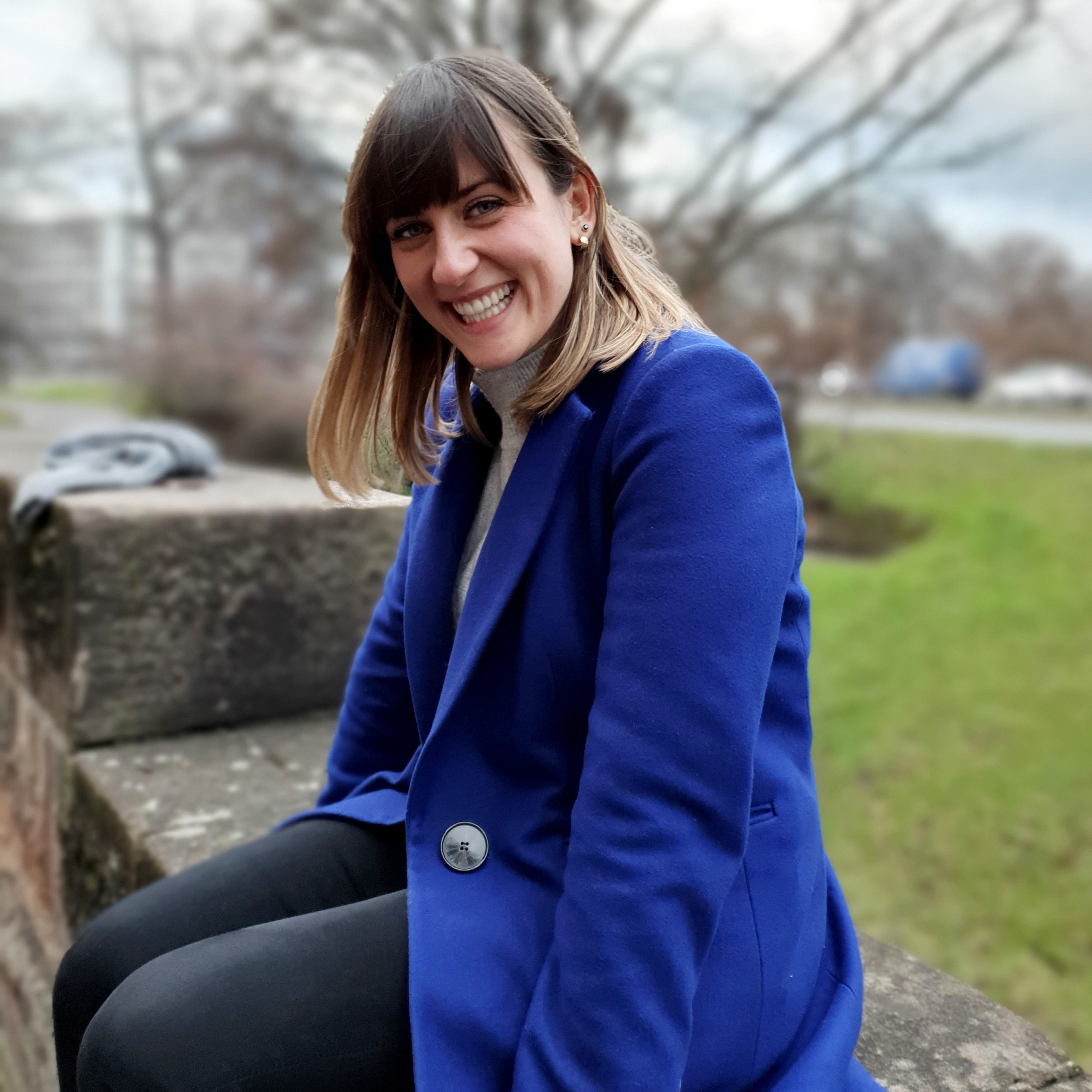
“Coming to Nürnberg was like a holiday for me. I grew up in Schwabach, breathed Nürnberg air as a teenager, even lived by the Neutor, and of course I thought it was cosy and nice here, and there were a few places we enjoyed going to, but that’s all. Back then, I thought I knew the city … At 17, I moved to Munich, spent a very intense six years there and returned to Nürnberg last year with all these experiences and impressions – and couldn’t believe all the things this city has to offer. I expected nothing. You see a city completely differently when you’ve been away for a while, and for me it was suddenly like living in a picture book, finally unpacking my bike and exploring everything. And it’s wonderful! The feeling of being at home, being part of Franconia. It may grumble, but doesn’t take itself too seriously – the people are content and pleasant, which is sometimes just better than a hip, big-city attitude. And everything is so easy; I feel safe and secure here, I don’t have to be afraid, and I am not completely overwhelmed by all that’s on offer since I can’t do it all anyway … But there is so much to do, experience and discover here. Over the past few months, I’ve rediscovered my home town, attended lots of events and visited places for the first time, I’m bowled over – even if I think it is pretty silly that this is about the only city where you can’t sit outside in street cafés all year round! And I also think places like the city beach or the planned surfing wave are quite odd – Munich has its Eisbach, Nürnberg doesn’t. But Nürnberg has a lot of great natural riverbanks, why aren’t they used differently, better, more beautifully, places where you can spend time, come together? I also miss the rooftops – beer gardens, parties, rooftop cafés, for example, on parking garages, or better use of the numerous roof terraces. What could be more lovely than to sit outdoors above the roofs of a…of this city?”
Instagram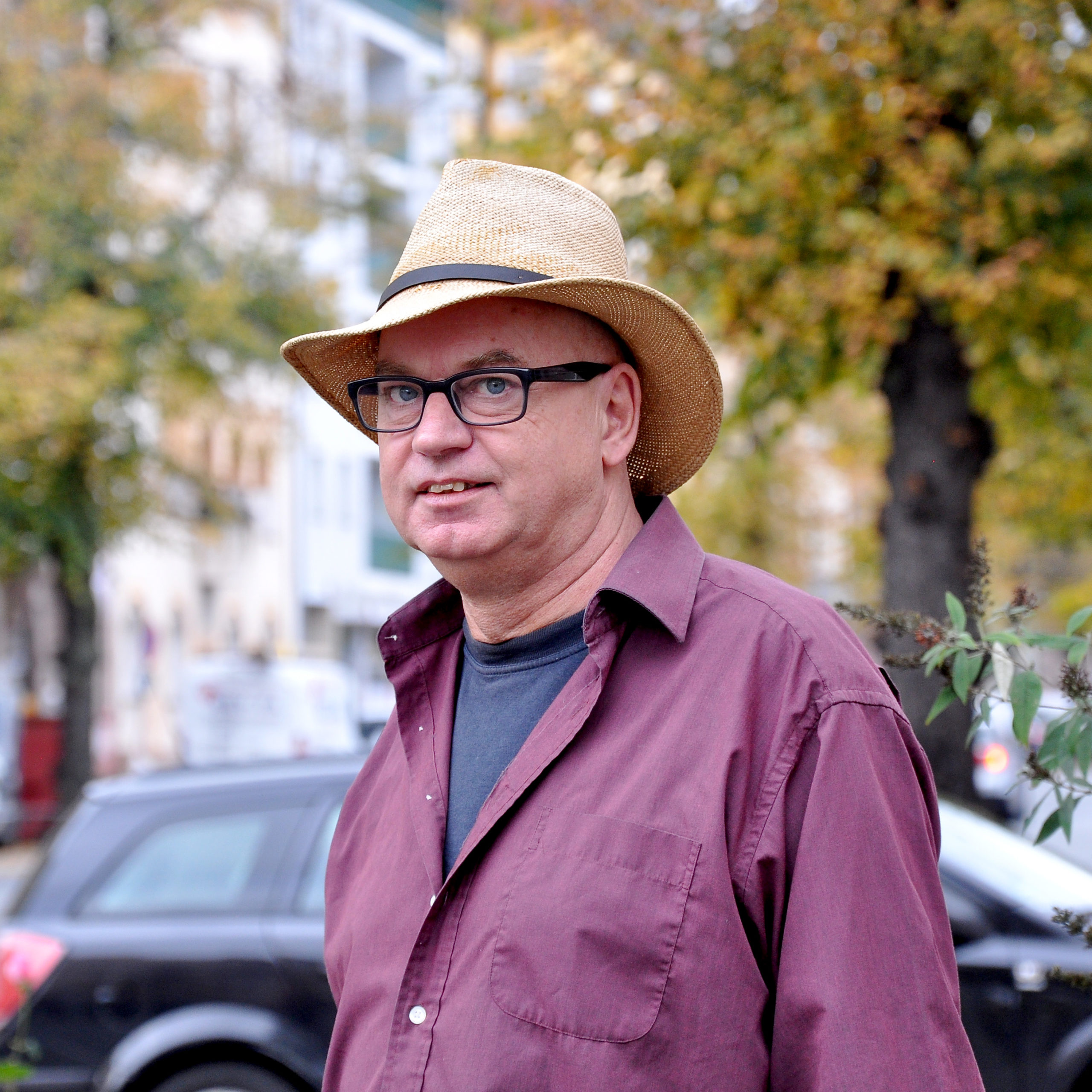
“Even though everything inside me resists it, I’ve boarded planes again and again for 10 years so I can make a difference in poorer regions of the world. The feeling I get when I’m on the plane is hard to describe. I have anxiety, break out in sweats, and, last but not least, endure incredible physical pain in every limb that really wears me down despite painkillers. As a child I was a member of the Regensburg cathedral choir. My dream was to become a singer and artist. I experienced atrocious abuse, violence, and mistreatment there over the years. During my time there I felt dreadful and even many decades later, what I experienced caught up with me. Of course, the experience leaves its mark. I was in treatment for 25 years and used various therapies and medications to grapple with those assaults and events. But even today, over and over again, I’m gripped by a feeling of fear that paralyses me. I just want to lock myself in the house, meet no one, and speak to no one. But when that happens I force myself to go out and try – especially in my role as a social worker – to transform this negative energy into positive actions. So a few years ago I decided to travel to places like Thailand, Cuba, and the Dominican Republic to help children and women there. During my travels I deal with the local people, give German and English lessons, distribute teaching materials and books, and emphasise how important schooling is. Not infrequently, women in need come to trust me and tell me their stories. Just recently, a woman from Thailand proudly sent me a copy of her divorce decree after she finally got up the courage to leave her violent husband. In addition, I use my creativity as a painter, poet, and cabaret artist to process my experiences and have been doing my part in Nürnberg for many years. My wish is that many institutions and the press would take artists more seriously. There are a lot of good things emerging in Nürnberg, but it’s sadly not visible.”
Instagram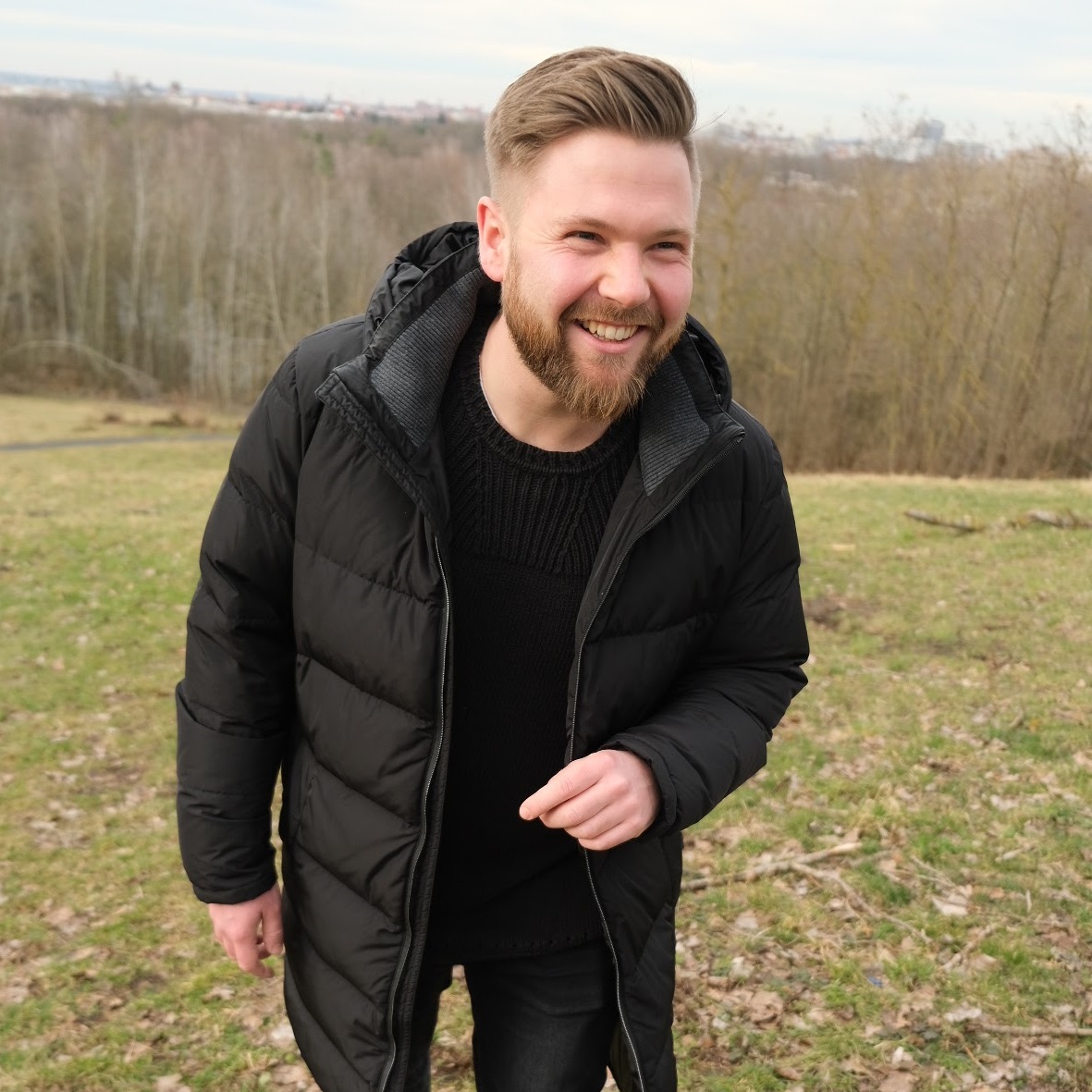
“Izmir, Budapest, Nürnberg … I’ve tried other cities, tested other cultures, breathed different human worlds – I always only wanted to live here. I’m deeply rooted in Nürnberg, I like knowing the city inside and out by heart, but still finding new corners, new places, new ideas. This probably works particularly well if you are both open-minded and constantly travelling by bike ‑which I am. Thanks to super short distances and the central location in the region, you can cycle to everything inside the city as well as in the surrounding area. You are flexibly mobile and, without much effort, make the pathway your destination ‑Even when the city is more interested in making sure tin boxes can roll smoothly or simply waste living space with parking. The destination is only one part of the journey, here I can find the perfect conditions for any occasion: Forests, meadows, and famous hiking trails practically on your doorstep, all surrounding a major city. This combination in the so-called pleasure region includes Germany’s highest brewery density – it’s outstanding to me! While I commute happily between open-air concerts and barbecues in the warmer months, during the colder months I have more time to wonder about various developments. For me as a business economist, the VGN in particular is an opaque, unprofitable company whose pricing and unsatisfactory offers are not a good look for a city like Nürnberg. But the people in charge have practise in sugar coating criticism. Okay, but before I live up to the cliché of the grumpy Franconian: I love the flair of the old town, the warmth that the sandstone radiates deep into the night when people in the alleyways make room for silence. I love the many bridges we like to sit on, watch the goings on, becoming part of the city – ideally with a glass of white wine in hand. La dolce vita in the middle of Franconia. Perfetto!”
Instagram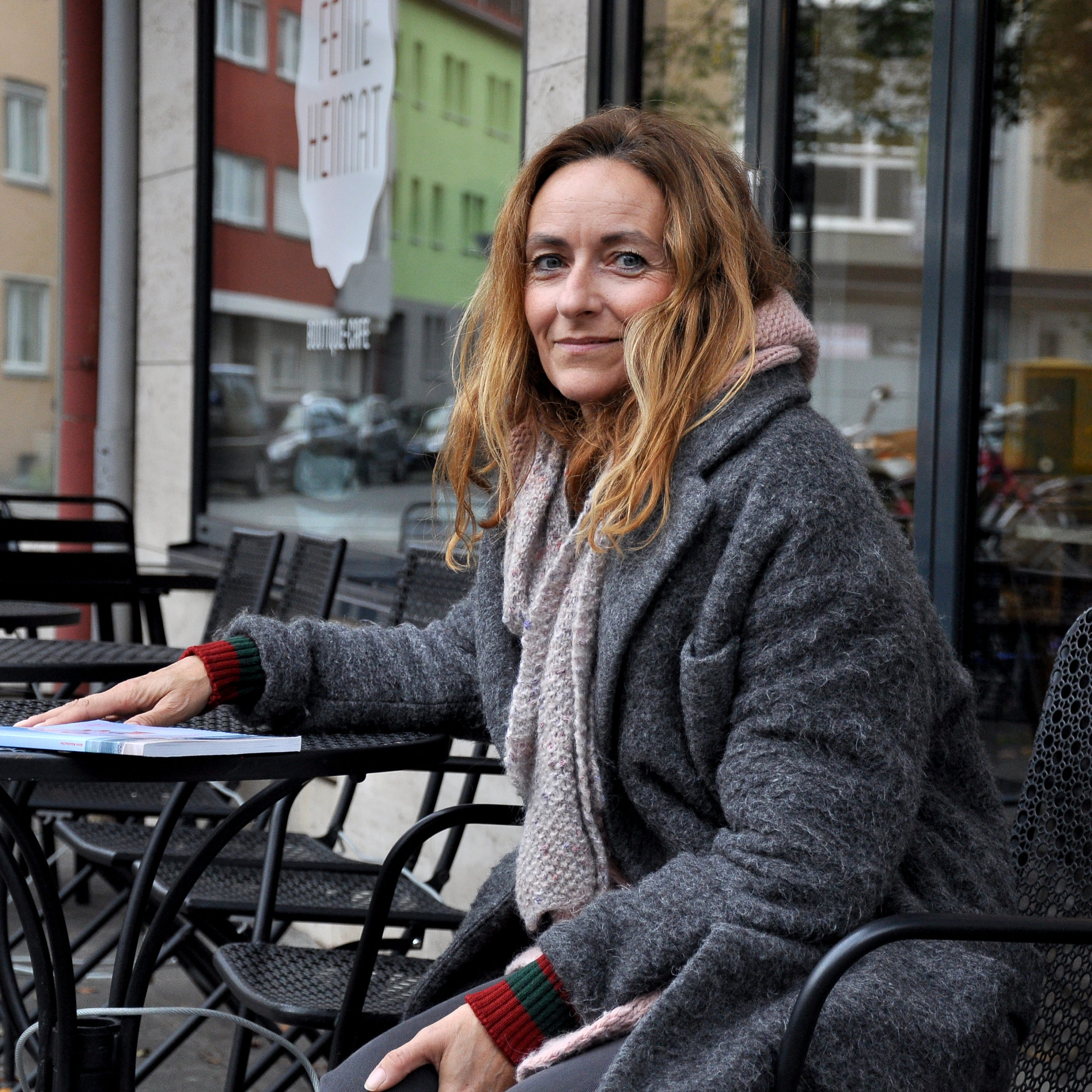
“Five years ago, we first became aware of this: we were on an island on a family vacation and saw a lot of packaging, plastic and waste on every beach — some of this rubbish comes from the mainland and is flushed or blown to the beach. We just started picking up the garbage. At that time people looked at us weird — nobody helped. Today, many cities take part in our “Beach Cleaner” initiative — in Europe and even America. We meet for collecting trash, give lectures and stimulate discussions on sustainability and waste prevention. It is high time to do something, our beaches, the nature and green spaces in the cities are littered and everyone can and should participate, so that our future generations also have a livable environment. The young people have understood and are raising the alarm, whether at the Fridays for Future demonstrations or on the internet and on the social networks — I think that’s great and I absolutely support them. In my opinion, the Greta Thunberg bashing and the criticism that the young people just want to skip school is embarrassing and outdated. Previously, the younger ones were accused of lack of interest in politics, now they are committed and demand what they deserve: a future! It would have been necessary to set the course for green decades ago, but now, when it is almost too late, the change is of course inconvenient. It is so easy to cause less or no waste in everyday life: We buy our vegetables directly in the „Knoblauchsland“ in Nuremberg, make our own detergent and cleaning products and otherwise go shopping in a store where nothing is packed. I would very much like Nuremberg to become a ‘Zero Waste City’, get advice and develop strategies for waste prevention. With our initiative and the Bluepingu club there are many competent people here who could make a difference. Other cities are already going green — let’s see when Nuremberg moves in.”
Instagram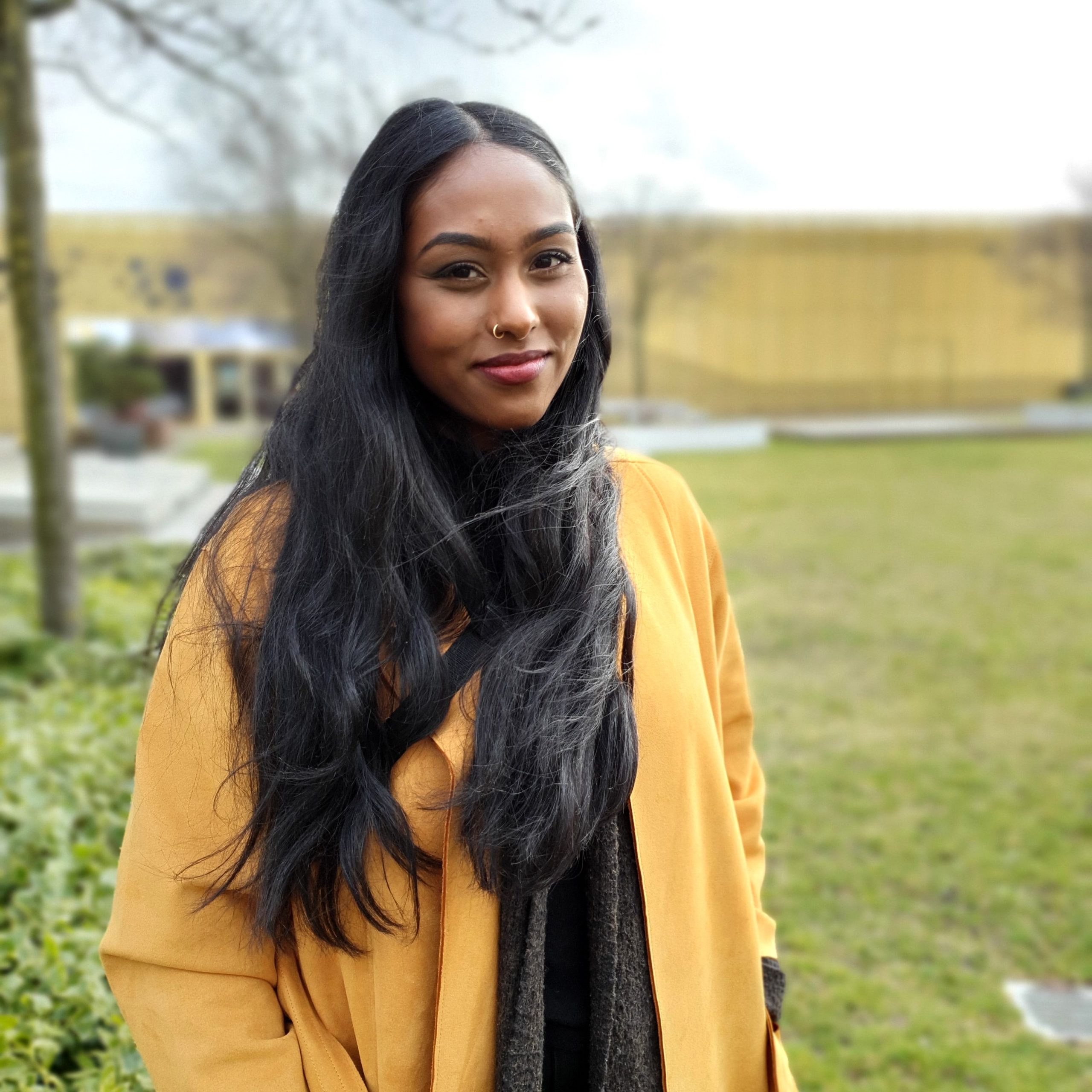
“What is the best thing about the cultural landscape of a big city? We are all no longer geographically confined but instead free to find ourselves everywhere – especially in cultural terms. That’s precisely why I think that the most important task of a big city is defining its self-image — as a place where many different peoples and cultures are gathered, joining these peoples and cultures together and actively offering the possibility for this to happen. That’s why I find Global Art Nürnberg so great. Here it is about connecting two seemingly opposite and completely different cultural aspects with each other and letting something new emerge from it. I am a member of the Tamil community. My parents came 30 years ago as civil war refugees from Sri Lanka to the reception centre Zirndorf. They have worked hard to provide their children with optimal living conditions, and above all, an excellent cultural education. For them this always included the preservation of our Tamil traditions, and I learned classical Indian temple dance from an early age. For me, dance is the highest form of consciousness, a form of meditation — and something I would like to pass on to everyone, reaching even outside our community. We teach not only the dance, but also the history and respect, which comes with the culture of dance, an attitude that I feel, is not very present in the current culture. However, this work is often made difficult for us here in Nuremberg – mostly because there are hardly any rooms available for us to teach and practice in, which is part of the task of the city administration. Unfortunately, the city often prefers to promote the familiar rather than try out new things. The work of N2025 has created an important opening. We are on the right track.”
Instagram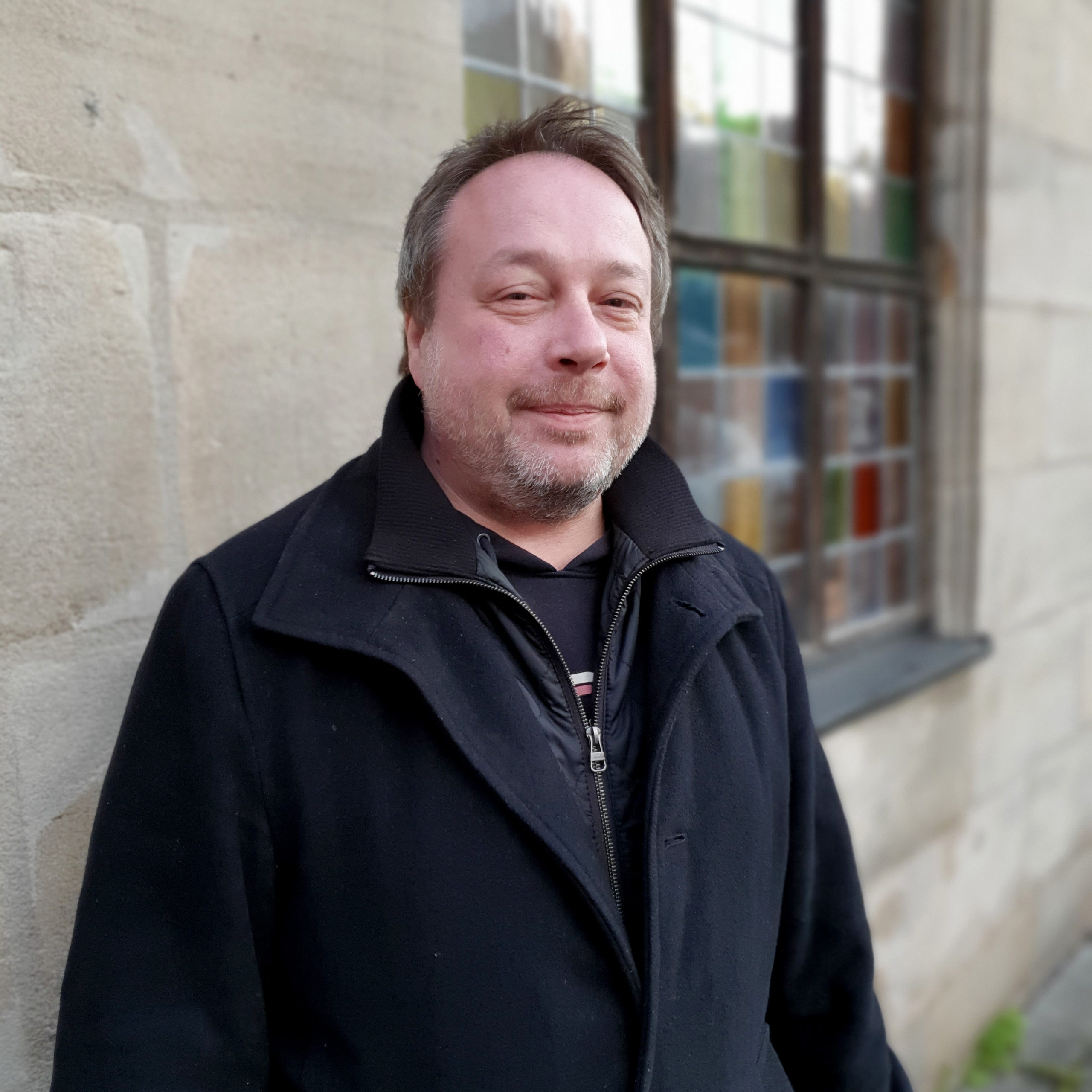
“Nürnberg? It’s actually perfect for me, apart from the fact that I’d like to grow old in the country. I’ve seen too many people who went to Berlin or Hamburg with big hopes and dreams. And they go down there, stray from their dream, somehow try to survive – or simply come back. Here, you have more opportunities because there are fewer people who make art and culture, there’s enough space for everyone, whether photography, painting or theatre. But sadly everything’s terribly bureaucratic; compared to other cities, the effort required to set up an event is insane, there are always stones being put in the way. I don’t know whether that’s a Nürnberg problem or a Bavarian problem in general. In Berlin, there’s a self-administered art and cultural centre on a parking garage roof in the middle of the city – how great would that be for us? But if you applied for something like that here, the city would just laugh at you, you shouldn’t even bother asking. I get the impression that it’s easier for some institutions than others. Perhaps there are too few people in the positions responsible who really have a clue about the cultural sector, especially subculture. In spite of all that Nürnberg is perfect for me, it has this wonderfully manageable size in which you can achieve everything, you can get everything if you want, it has an incredible number of good people who run a great cultural sector – but unfortunately often go elsewhere because they can’t move ahead here. If you understand Capital of Culture as an award that means ‘you’re doing everything right,’ then Nürnberg doesn’t deserve the title in my opinion. But it would be great if the bid process brought changes – for example, better financial support for the subculture. Above all, easing the bureaucratic hurdles. If someone deserves the award, it’s the creative artists themselves.”
Instagram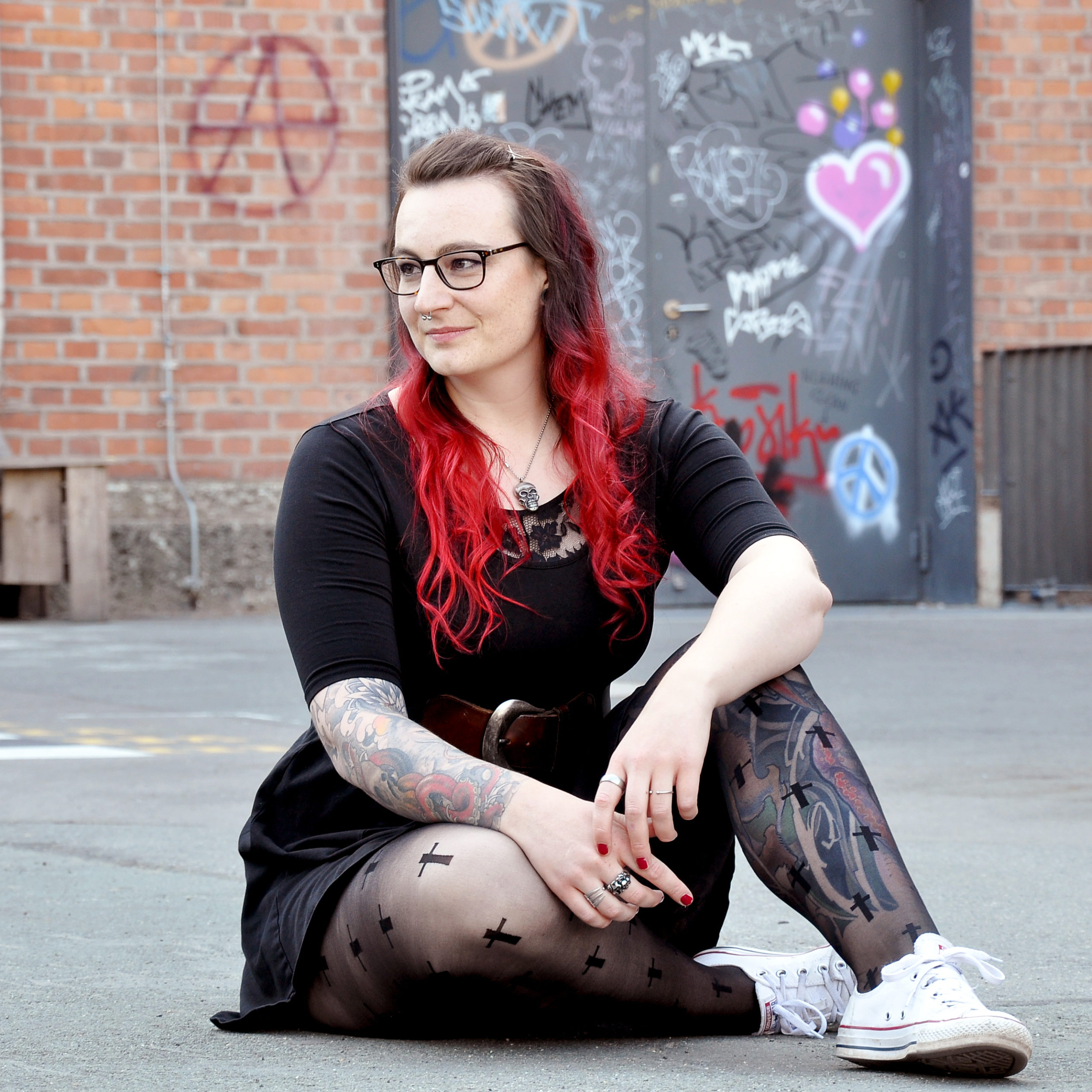
“As a 12-year-old, I discovered an orchestral version of Metallica’s “Nothing Else Matters” on a Bravo Hits CD. I had never heard anything like that before, so my love for Metal was born. When I heard that Nürnberg is applying for the title of European Capital of Culture, my first thought was that I would like to get actively involved. If there is any possibility to do more for the culture in our city, I would also like to see my genre represented. For some years, I and five to ten friends have been organizing metal concerts and since 2015 I am a singer in a metal band. In our underground scene, it is often not so easy to get an opportunity to perform, so we just took it in our own hands and founded the concert series “Scheppercore”. We felt immediately that there is an insane demand. An incredible number of bands contact us, mostly from the region but also from outside, and would like to play shows with us. On average, we have seven shows a year throughout Bavaria, for example in the Z‑Bau or in the E‑Werk Erlangen, where 150 to 200 people show up. Again and again I realize that many bands of the metal scene in Nürnberg or Franconia do not know each other. With our concert series we have set up a meeting place, you get to know each other and interchange. Especially in the underground you have to stick together and actively do something for the community, that’s very important to me. We do it all out of love and passion for our music. However, it does not work without support — from cultural institutions, for example. But we would like to have a bit more support, rehearsal rooms and meeting places have been missing in Nürnberg for years and also affordable venues are rare. Maybe the title of cultural capital can have a positive influence.”
Instagram
“Although German is my native language, I prefer to sing in English and write all my songs in English. I really like the language and somehow I find it easier to express myself artistically. Often, I am confronted with the stereotype that I naturally have more rhythm because of my African roots. I do not see it that way and find such statements quite blunt. At some point it was just logical for me to become a professional singer, because that’s what I like to do. Before I’ve started studying, I did not fully know what to expect. As a singer, you often live from engagement to engagement, but since I do not have a very high need for security, I get along with it super. I also somehow manage to afford everything I want to do. I like to travel, but I do not need a luxury hotel, I do not care for big cars and I do not have any children to look after. I am currently free and can do what I love and what feels right for me. I am very grateful for this privilege.”
Instagram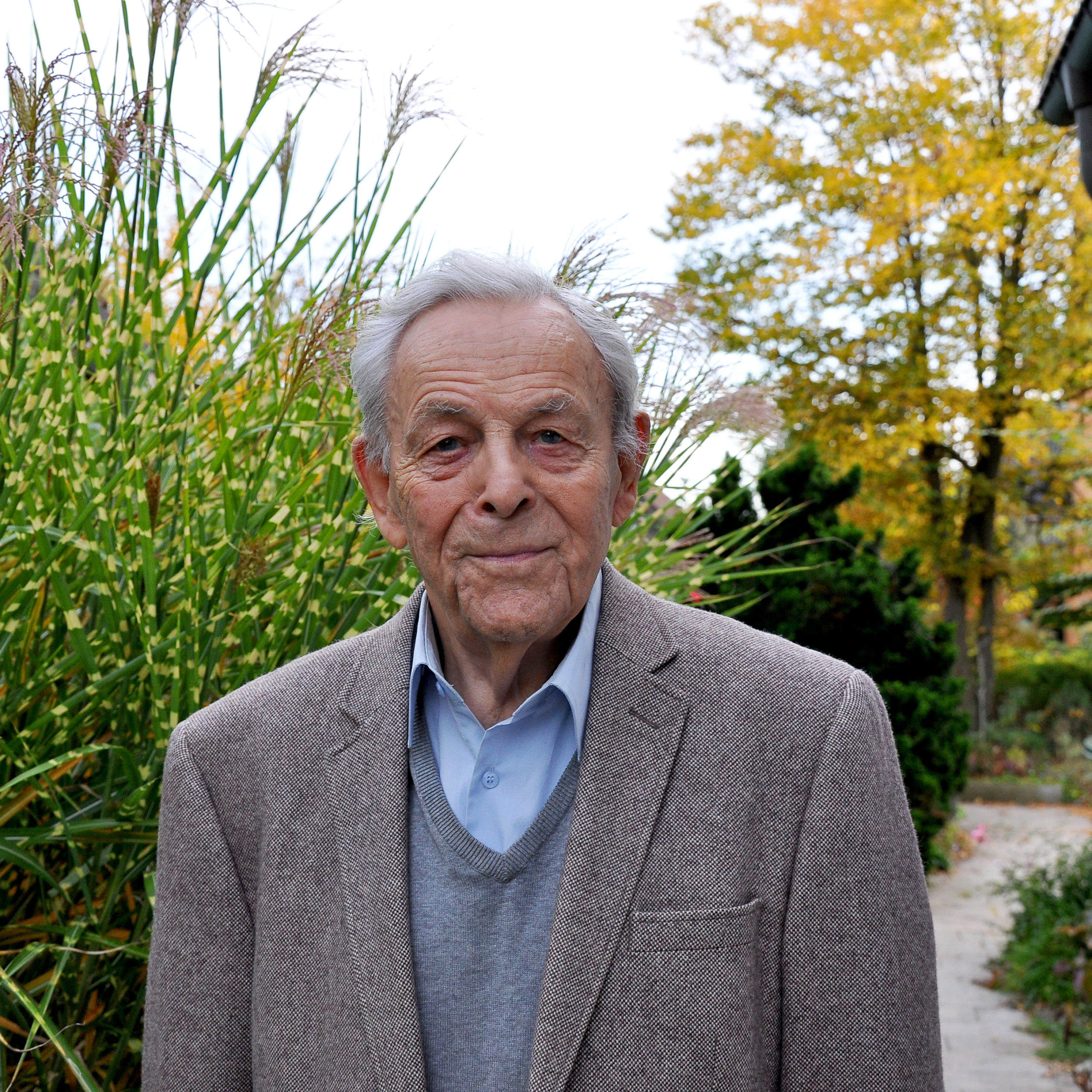
“I had to reinvent myself and bumble through my life multiple times. After the war, I made my way on a freight train to Silesia and traded salt and sugar on the black market to get my family out of the camp. Later, I won the lottery, built a mobile cinema from the prize and finally worked for a Franconian beverage manufacturer. At the age of 16, I learned to fly a glider in the Hitler Youth. In 1943, I volunteered for a special unit and was trained to lead a cargo glider and parachutist. One day it was said that we should exchange our aviator clothing for sailor suits. We were sent to Kiel, then to Italy. During the training as a ‘marine fighter’ we swam hundreds of laps every day until late at night. Our undersea diver equipment consisted of a rubber suit of 3 mm thickness, top and pants were connected by a rubber belt. Underneath we wore wool laundry. In October 1944 we received the order to sink warships in the port of Ancona. During the mission submarines were located and ordered the retreat. In a swell of five meters, it was all about survival and when our ’nut shell’ ran out of fuel, we swam for 13 hours to reach safe land. In the spring of 1945 my troop on the Oder was assigned to blow up bridges to stop the approaching Red Army. We learned about the end of the war a few days later. I came to Schleswig-Holstein in English captivity — I was 19 years old. What is war? The power obsession of a few potentates who want to change the world. Their ego is so big that they lose the reality to their environment. When you grow up as a young person in such a system, you see a lot of things in retrospect. When I look at young people today, I often miss a certain ingenuity and courage. My life has had so many episodes, but I never gave up. I want to pass on this energy to future generations.”
Instagram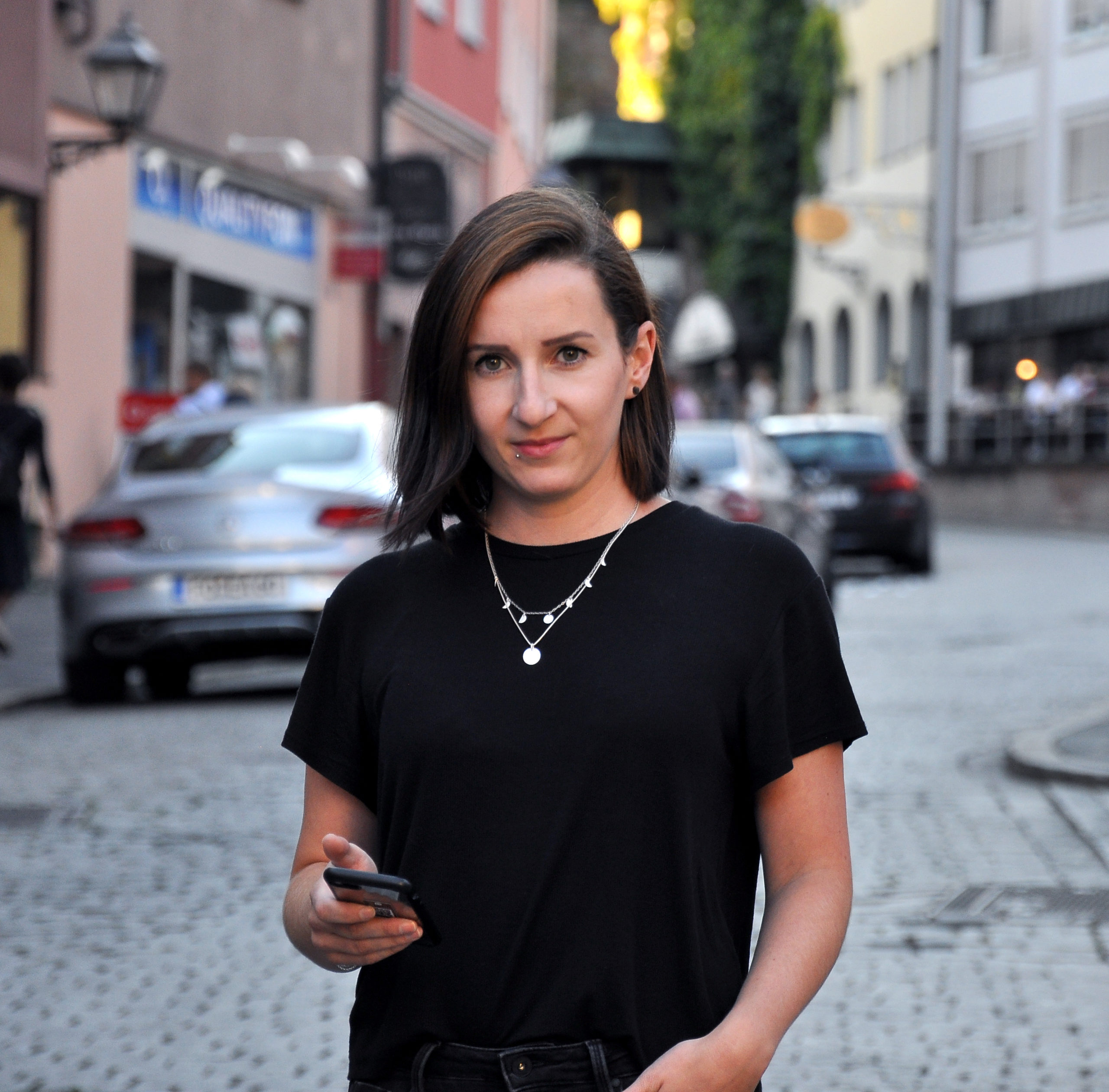
“As a social media editor, you need a thick coat. On the one hand you meet and get to know strangers in everyday life with courtesy and understanding and on the other hand, many people seem to lose their inhibitions and good manners in the world wide web. Of course, ‘I should be allowed to say so’ and I would absolutely not attack the freedom of speech. A critical mind is always good and a procreative discussion is in my opinion more effective than a consensus of convenience. That’s exactly what I found so exciting at the Nuremberg application as a cultural capital: you put your finger in the wound, draw attention to grievances and start changes in many areas. Of course, we often can not implement improvements or changes immediately, sometimes we can only give thought-provoking impulse or shift the focus. Many processes also take time. I would like to see more people in Nuremberg being constructively involved in shaping their city and their living space. Just do it yourself, develop something or let ideas mature instead of just criticizing and rejecting innovations. I believe that positive energy can cause more than negative. In my opinion the people in Nuremberg could be more open for outside influences, for innovations and for the unknown.” Sometimes people who meet me are surprised that I was born in Romania. ‘Man, I didn’t noticed that at all’, is a sentence I hear a lot. I often wonder if this should be a compliment and how these people imagine a Romanian. I really hope that we bring the people in this city and in Europe closer together and help to take down inhibitions and prejudices. That’s why I invented #humansofnuremberg. This way we do not only live side by side peacefully, but creatively and openly and shape our world together.”
Olivia Barth-Jurca, Public Relations — Media Relations, Online & Social Media N2025 Bid Office
Instagram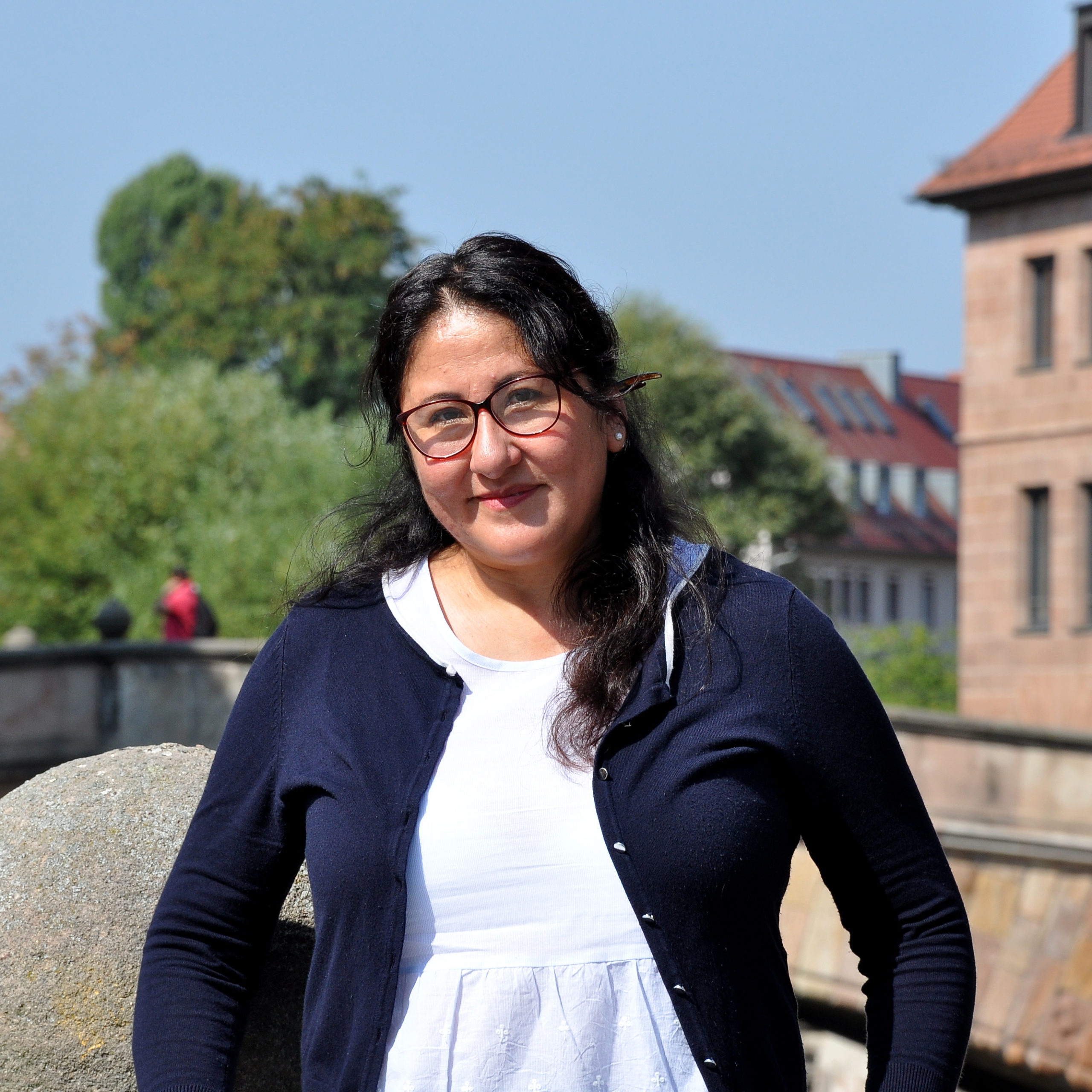
“Coming to Nuremberg as a South American was a great adventure for me. I really just wanted to spend a few months vacationing here. It was a beautiful, very hot summer and I fell in love with this city and the people. As a student I moved to the dormitory here in the Heilig-Geist-Haus, where our office is now — I even used to live on the same floor. At the end of my studies, I always wanted to return to Peru, when I met my husband, I got married and we had our daughter. I’ve been living in Nuremberg for over ten years now. I am sometimes asked how I handle the mentality of the Germans or Nürnberger. South Americans are konwn to be always friendly and open, while the Germans are more likely to be uptight and stiff. I can not confirm this cliché at all. I‘ve met very lovable and interesting people here. What I find curious to this day is that people here are often very suspicious of others and have little confidence, where everyone here has a lot of security and not much to fear. Through culture I got to know Nuremberg, the traditions but also the modern life. That’s why I like it so much working for N2025. Working in administration, I get in contact with many different people — often internationally. The title European Capital of Culture represents a major challenge for Nuremberg in many aspects. In the application process, all residents are invited to actively participate, with ideas but also with their own behavior and the external impact. Until the year 2025 I would wish that every Nuremberger participate, be it the taxi driver, the bratwurst saleswoman or the stall owner. Additionally, I hope each Nuremberger understands themselves as an ambassador in Nuremberg and meets all guest and tourists so friendly and openly.”
Maria Rink, Administration N2025 Bid Office
Instagram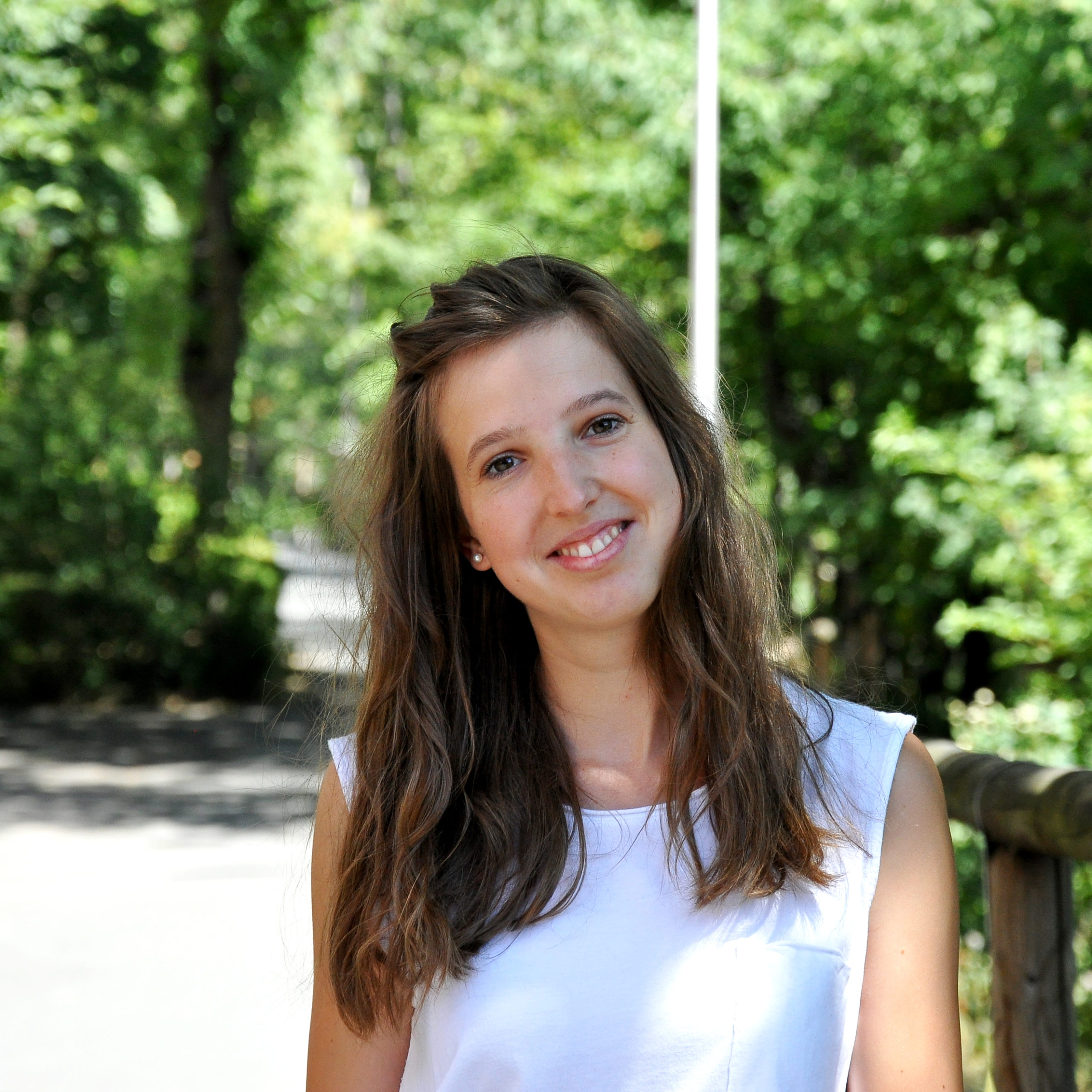
“I immediately found the idea exciting that Nuremberg, the city where I was born and grew up, is on its way to becoming the European Capital of Culture. As part of my master’s program ‘Cultural Education and Cultural Management’ I joined the team as an intern and am now part of the application office as a project assistant. I have worked in various cultural institutions and for various projects in cities like Augsburg or Mönchengladbach, but in my opinion there is no more complex project than the application for the european cultural city. N2025 is about the whole city, including the region, about urban development and about spinning and making ideas possible under the umbrella of a broad cultural concept. I find it particularly nice that in our work we get in contact with many people in various ways and engage with the Capital of Culture advocates, artists, cultural workers, activists from the most diverse areas, but also with critics of the idea. In our actions with the mobile office or the ‘Plauschbecken’ you can feel immediately a lot of positive vibes, but we also receive great ideas at the office. You can feel that there is a lot of potential in Nuremberg and it is incredibly exciting to embark on a journey into the future of our city and our region. This means for all of us: trying out, questioning, rethinking, thinking outside the box, experimenting, playing, discussing, sharing, creating, shaping — together.”
Hannah Straub, Project Management & Metropolitan Region N2025 Bid Office
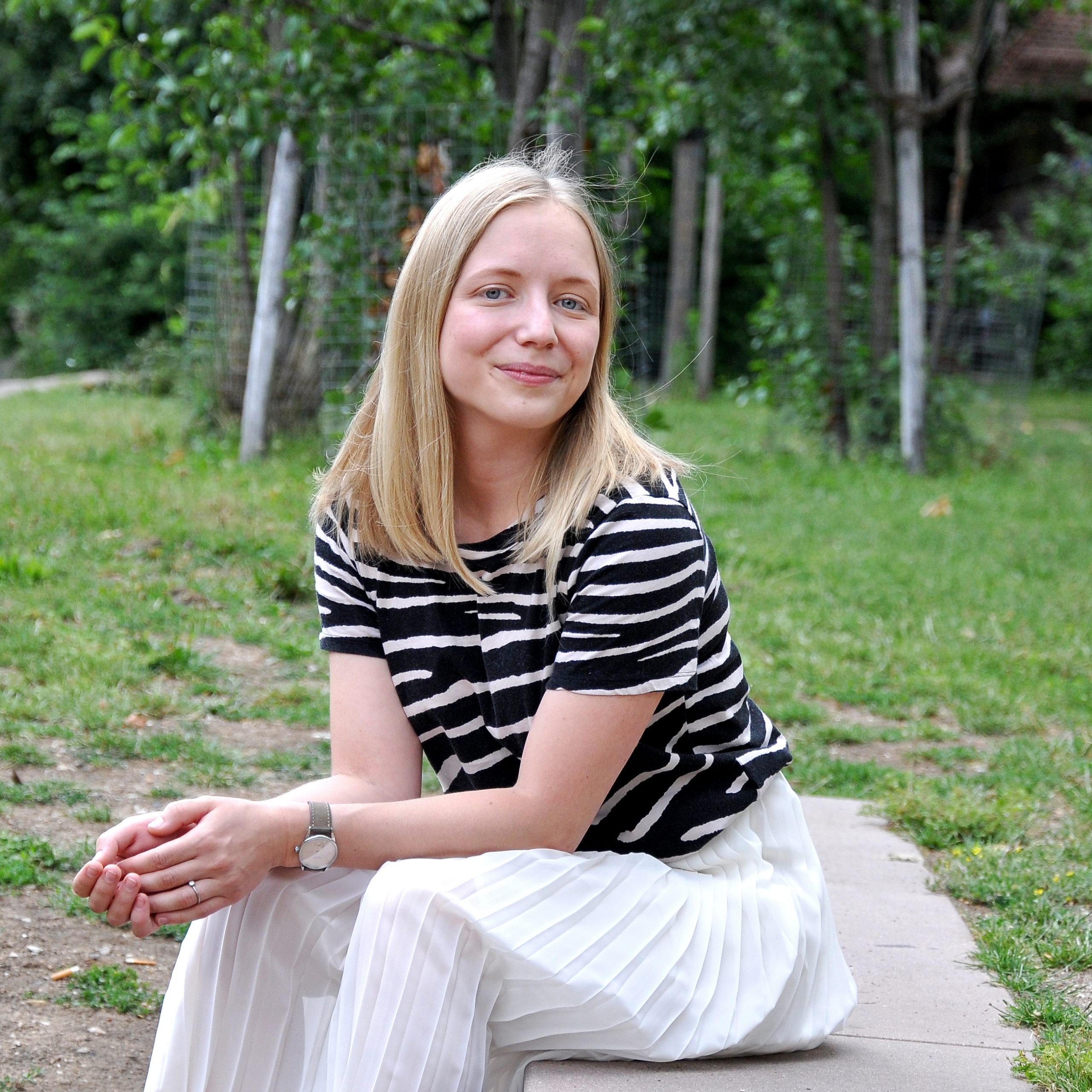
“The fact, that I am preparing Nürnberg’s European Capital of Culture Bid is somehow funny, as I am originally from Munich and also do have Ukrainian roots. In the course of my life I moved away from Nuremberg several times – but I always came back. I like living here. Nuremberg has so many secrets and hidden potential that I find super exciting and just need the chance to come to the surface. That’s what makes my job so exciting. I can give many people the opportunity to make and create culture and gradually change our city. Some people would like to change everything immediately, preferably already yesterday. However, transformation processes also need time and patience to be sustainable. As a kid, I‘ve lived in the north of the city. I have never been in the south part of Nuremberg, there was no reason. Today I live in the south city, get to know many exciting new aspects of Nuremberg and our diverse society and come across a lot of incredible contrast. Already from home I know transculturality, I grew up trilingual, which of course influences my point of view on different ways of life and stereotypes. Recently, an elderly gentleman came up to me and told me that I did not look Ukrainian at all. This shows you the stereotyped thinking we are still surounded with. I sincerely hope that through the Capital of Culture we can break up such thoughts and bring the city community closer together in its diversity.”
Tanja Ehrlein, Outreach & Audience Development N2025 Bid Office
Instagram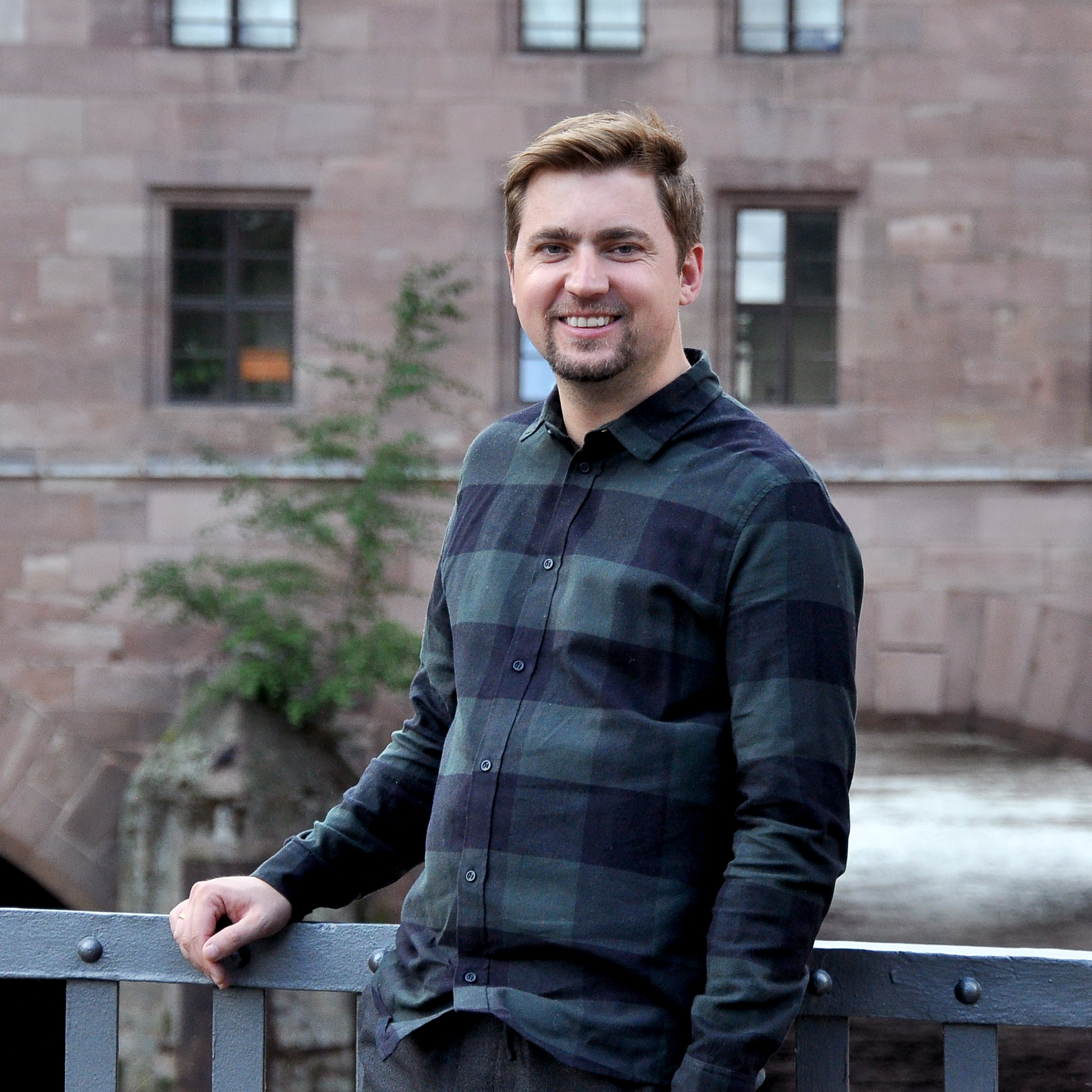
“I grew up in a contemplative — sorry Petersaurach — ‘hicksville’ in the metropolitan area and came as a teenager especially to Nuremberg, to go shopping, to go to the cinema or even to visit a concert in the club ‘Hirsch’. Today, where I‘ve lived here for 2 years, of course I see the city with completely different eyes. To work on such an application is a great adventure that brings surprises on a daily base. Nuremberg is a great city for me, full of contrast. A city that can be incredibly beautiful, but in some corners also remarkably ugly. There is so much internationality, cosmopolitanism and madness here, but then there are also areas that are surprisingly small-minded, closed and old-fashioned for a city of this size. We franconians are very proud and yet somehow caught in self-doubt. All these contradictions together make up the charm that only exists here. Nuremberg is on the go, you can feel it. There are so many initiatives that want to promote the city. The application for the European Capital of Culture can be an additional catalyst for this. And Nuremberg has a lot to tell Europe. My wife is Hungarian, therefore I’m often in Budapest. I’ve also lived there for 2 years. Unfortunately, you can see right now in Hungary how the past is exploited for nationalist rhetoric and for dubious political purposes. The racial laws from 1935, the Nuremberg Rally from 1927 and the Nuremberg Trials from 1945: Nuremberg can negotiate like no other city with the whole of Europe, why nationalism in the 21st Century can not be a good idea. Learning from history is as important to Europe today as it has never been. At the same time, however, we must not stop at ‘coming to terms with the past’. We could also switch to future mode and go new ways in the right direction. That’s exactly what the motto of the Capital of Culture application ‘Past Forward’ means to me.”
Nico Degenkolb, European Dimension & Metropolitan Region N2025 Bid Office
Instagram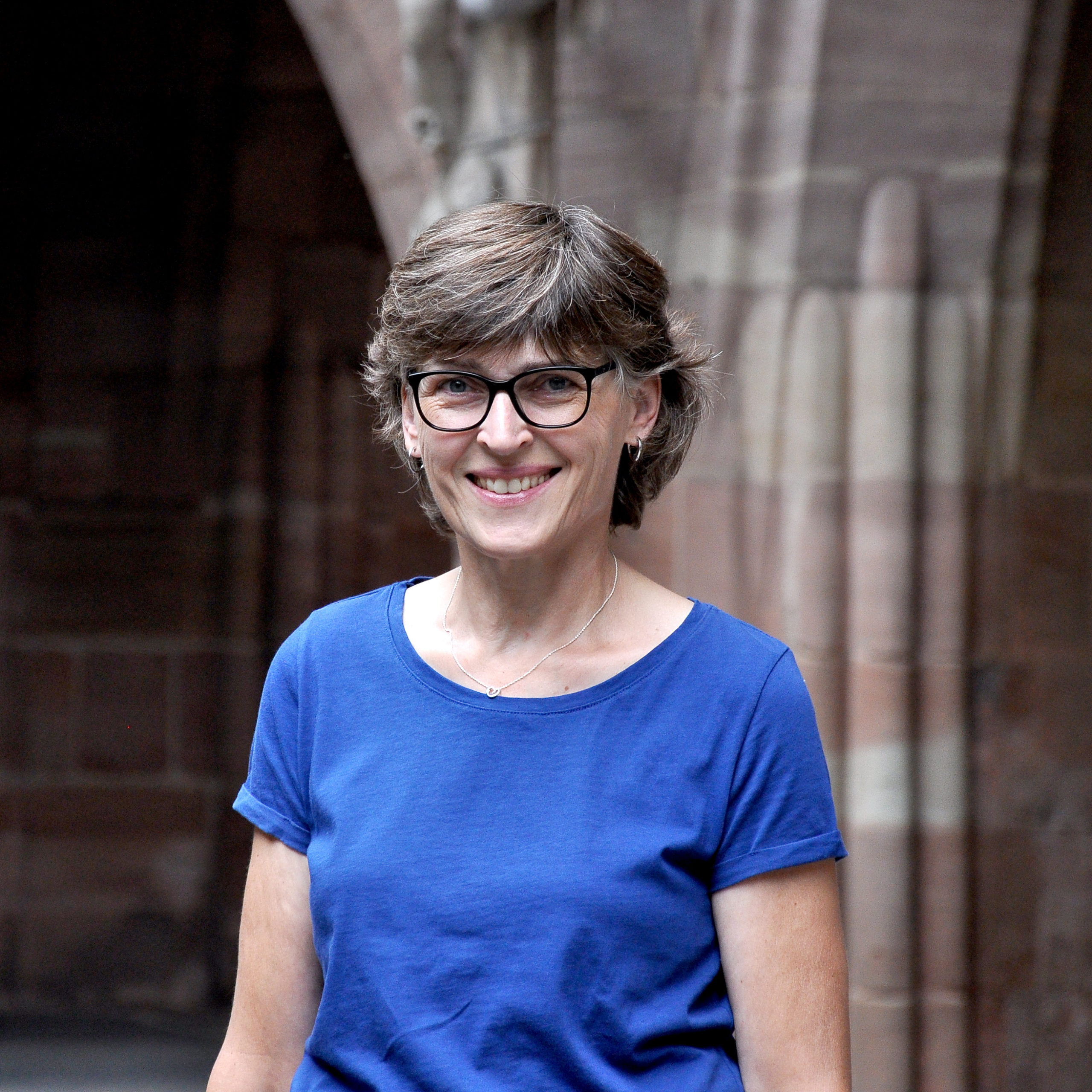
“In the application office, no day is like the other. Administrative activities in the field of culture are anything but monotonous and dull, on the contrary, the work at N2025 is very diversified and exciting for me. I have always been very interested in culture, the international guests who visit us, the exciting artists we deal with, the many creative ideas that reach us … Once, unexpectedly, I had Renate Schmidt on the phone. That was something special for me. I am glad to be part of this trip to the Capital of Culture and I am also a bit proud that I can contribute to it. Especially since I became a grandmother, the topic of sustainability is very important to me. I would wish for my two grandchildren that Nuremberg gets greener and had more playgrounds. I travel a lot by bicycle and also covered 900 kilometers on my bike during my summer vacation this year. The bike path network in Nuremberg has to be expanded, so that more bicycles and fewer cars are traveling in the city. The bike path structure in Holland could serve as a good example. In addition, many places in Nuremberg are hardly used, often they are paved or concreted. I would like more revegetation and enlivenment of such places. I am sure that we can get the title as European Capital of Culture and thus change a lot in the city positively.”
Birgit Korder, Administration N2025 Bid Office
Instagram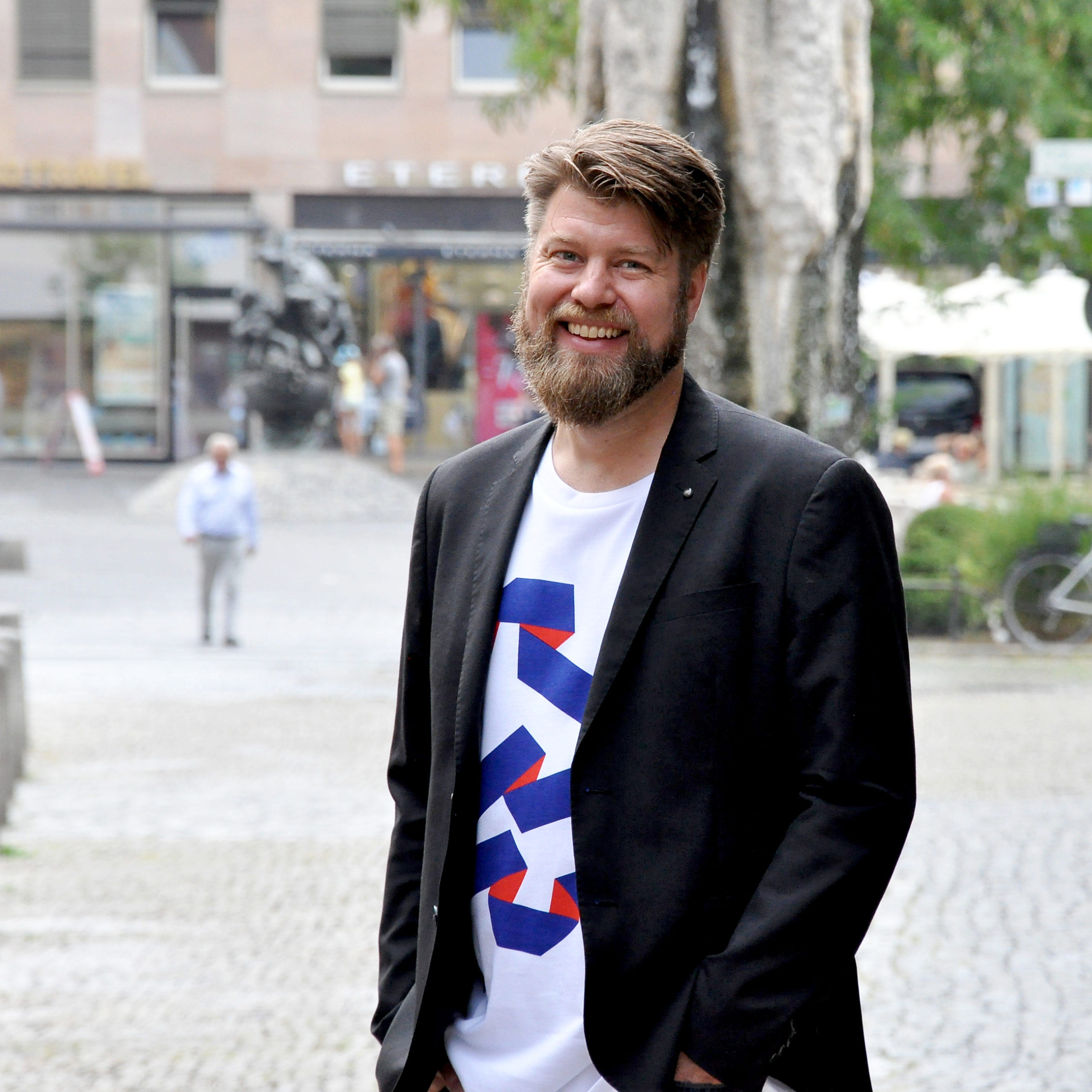
“I‘ve lived in Nuremberg and surrounding area since my birth, I feel at home here and emotionally connected to this city. Therefore it is very exciting for me to help shape the way to the European Capital of Culture. You get to meet many people, get to know new facets about the city — all that makes our project so special for me. In public relations you are often confronted directly with opinions, criticism, and reactions of the people. Some people don’t want to hear anything of the topic of the bid as European Capital of Culture anymore. The others criticize, they get too little information and we haven‘t reached the population yet. But the project N2025 is a marathon and not a 100 meter sprint. It is not easy to euphoricize people now, for an idea that seems so far away. But I have the feeling that we have already reached a good part of the people in Nuremberg and I hope, of course, that we can inspire many more for the Capital of Culture. One of my highlights, so far, was to experience the great group Rimini Protokoll in the city. Through their performance theater I got a completely new view of Nuremberg. Moreover, I like our new design and our claim PASTFORWARD. Sometimes it happens in newspapers that commentaries about social issues are played off against culture issues, which I think is a pity. Of course, social aspects must be right — good schools, kindergardens and infrastructure are important. But art and culture should not be forgotten — a city always needs both. This is especially important today if you want to find answers to the big problems of our time. I wish that the people of Nuremberg would come closer together and become a little more open and relaxed when dealing with each other. One of the big issues of our time is the environment. In this case I wish for a rethinking that’s sustainable – not just planting a few trees — but an environmental awareness that is anchored deep in the mind.”
Andreas Kist, Public Relations N2025 Bid Office
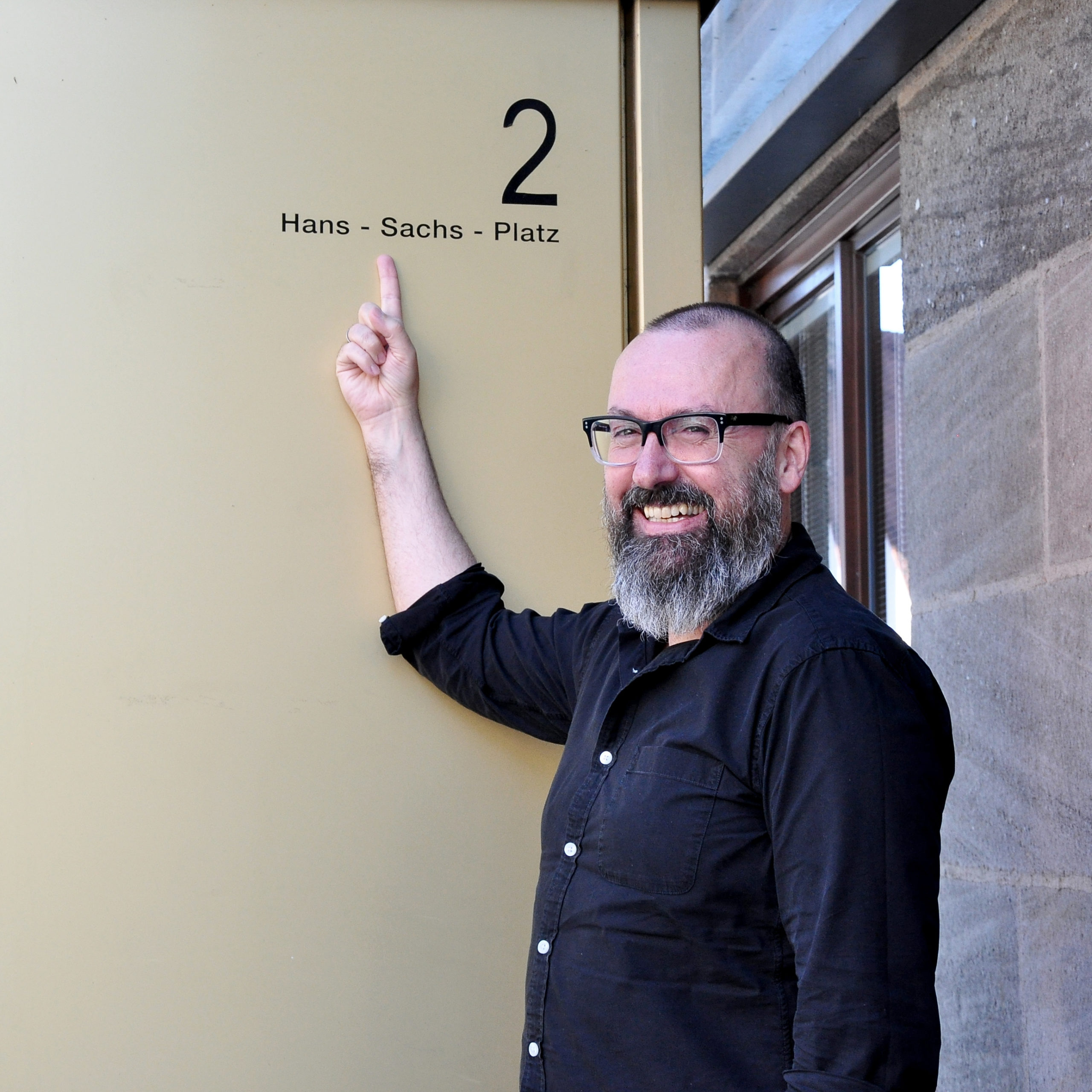
“Before I came here as head of the N2025-office, I did not have an idea what Nuremberg would be like. At first, I didn’t like many aspects of this city. Cologne, where I spent many years of my life, is architectural much more open. The inner city of Nuremberg is shielded by the castle wall, and the structures are here in some places rigid and over-regulated. But there was a moment in the spring when I suddenly saw Nürnberg with completely different eyes. It was one of the first mild evenings of the year, people were out and about sitting together. I walked through the city and thought, ‘Oh, it’s actually really nice here’. The Nurembergers have the image of themselves that they are reserved. But from the beginning I have come across open, helpful, and communicative people. I always chat with my neighbors when we meet. Whether I talk to aresident at the Südstadtfest about our plans for the Capital of Culture, or work on the bid book with the mayor, every day is different in my job and that is exactly what is exciting for me. I am constantly being confronted with new things. I’ve worked in cultural support before and topics like accessibility or urban development are new areas for me, but they are essential to our assessment. There are also many different expectations of the people that we certainly can not all meet. Whether it is the woman who turns to us for the quality of the yellow bag, or the father, who wishes to be able to sit quietly with his son on the balcony in Wölkernstraße, without car noise and exhaust fumes. In many sectors we can only initiate change and point in the right direction. Nuremberg is in many minds still “Dürer and Führer”. We want to oppose this cliché with the Capital of Culture, because Nuremberg is much more.”
Prof. Dr. Hans-Joachim Wagner, Head of Bid Office N2025
Instagram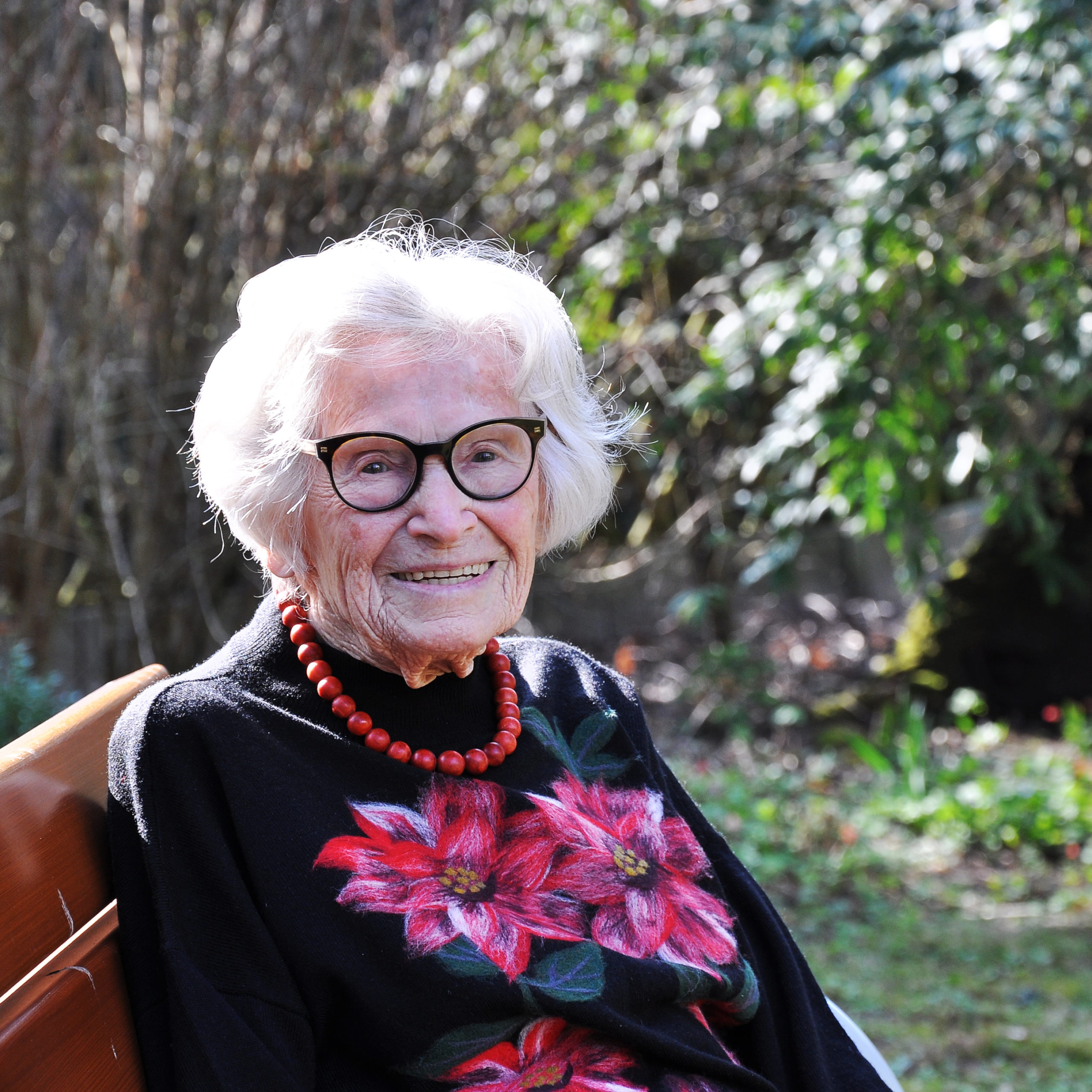
“In 1945, I had to leave my homeland the Czech Republic very quickly because I was married to a German soldier. With the help of my father, I managed to pass the German border in the middle of the night and I came to Michelau and started a carpenter’s shop with my husband, Karl. The beginning was very hard for us, we had to work all day, and all night to make the business successful. In 1968, once the shop started to take off, Karl died. I stayed in our house in Michelau for many years until I moved to a retirement home in Nuremberg in 2005. My belongings were packed away and my beloved house emptied. However, I’m glad I could take my photographs with me to my new apartment. Now, I am very happy to live here. Life is much easier and I can afford things that I only dreamed of as a young woman. In the past, culture didn’t play a big role in my life since we had to work hard for our business and were not able to drive to the closest theatre which was in Coburg. During the last couple of years, I discovered the cultural variety of Nuremberg: I visited the theatre and the opera with a friend who also lives in the retirement home, I took part in a vintage car tour, and even visited a burlesque show. In November, I turn 99, but I never think about it. There are many people here, who whine about their medical condition every day. My hands hurt too and I cannot see very well, but I would never complain about it. That’s just the way it is. I still want to be part of everything, I would never miss one of my granddaughter’s concerts and I’m looking forward to dance at the wedding of my second granddaughter this year. To be surrounded by my family, to be there for them, that’s what keeps me young at heart and gives me strength.”
Instagram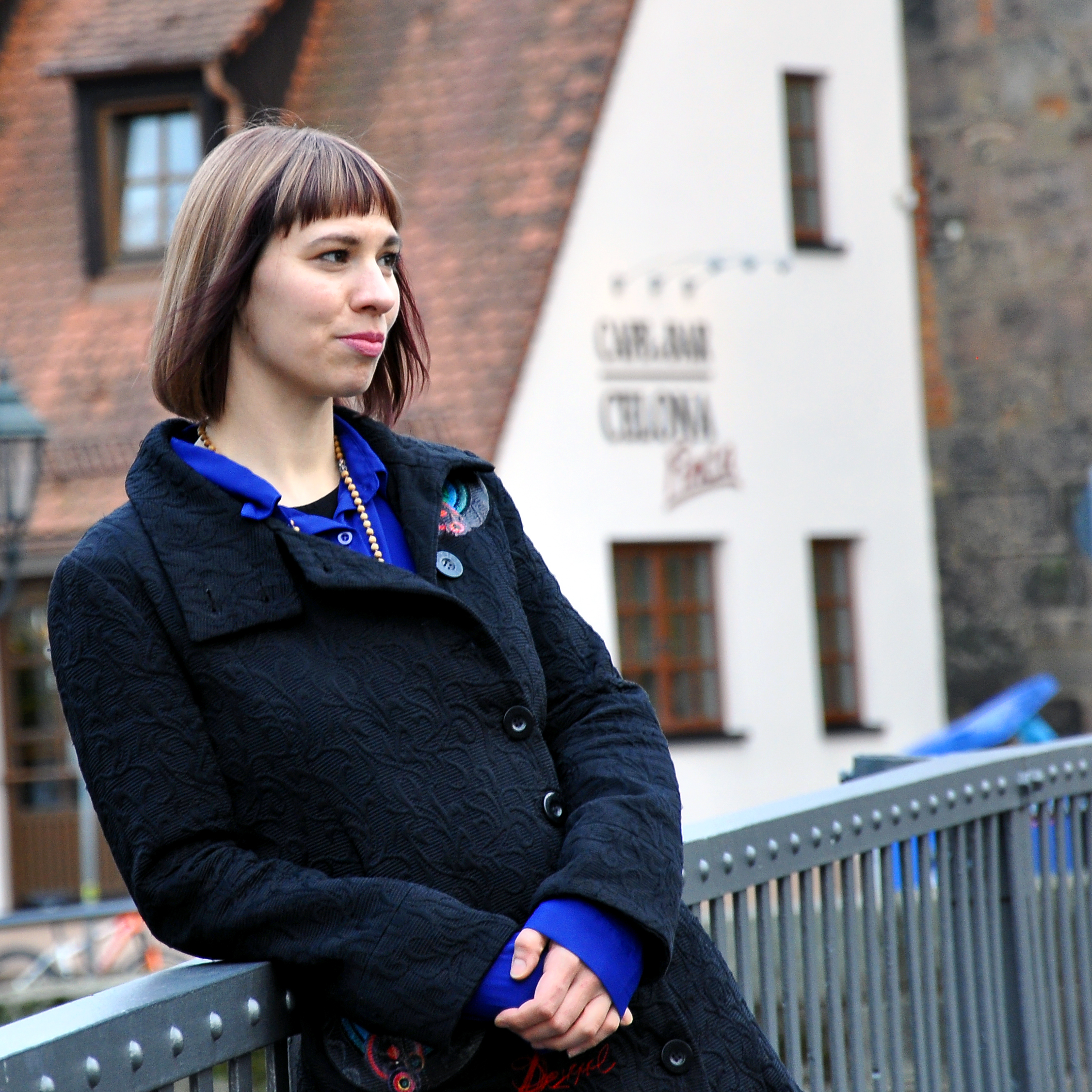
“I don’t think that the people in Franconia are as grumpy as people say. People treat you just as you treat them. It is like that all over the world, and of course, also here in Nuremberg. I love this city very much and in my opinion, Nuremberg is the perfect size. It is big, but not too big. I can dance until dawn in a club but also take in a quiet view from the castle. I moved here from Hersbruck when I was 23 years old. After, I graduated from fashion-school as a dressmaker, after that I became a professional hairdresser. A few years ago, just for fun, I took part in a wrestling event (NBG Trash Wrestling) and surprisingly, I developed a great passion for it. When I told my parents, that I wanted to start wrestling, they thought I was totally crazy. They couldn’t understand why I wanted to start fighting as an adult when they protected me for my entire childhood. The wrestling school in Heßdorf became my holy place. Here everyone is the same. No one cares that I am a hairdresser or even a woman in a perceived masculine domain. When wrestling, you switch off your brain and dive fully into the moment. I have never experienced this before with other sports or hobbies. I love my job as a hairdresser but walking around a chair is just not enough for me. After a wrestling session, I always feel full of energy and I feel strong — as if nobody could ever harm me. Even though everyone says that I have a screw loose, I want to improve my skills and maybe even become a professional wrestler someday.”
Instagram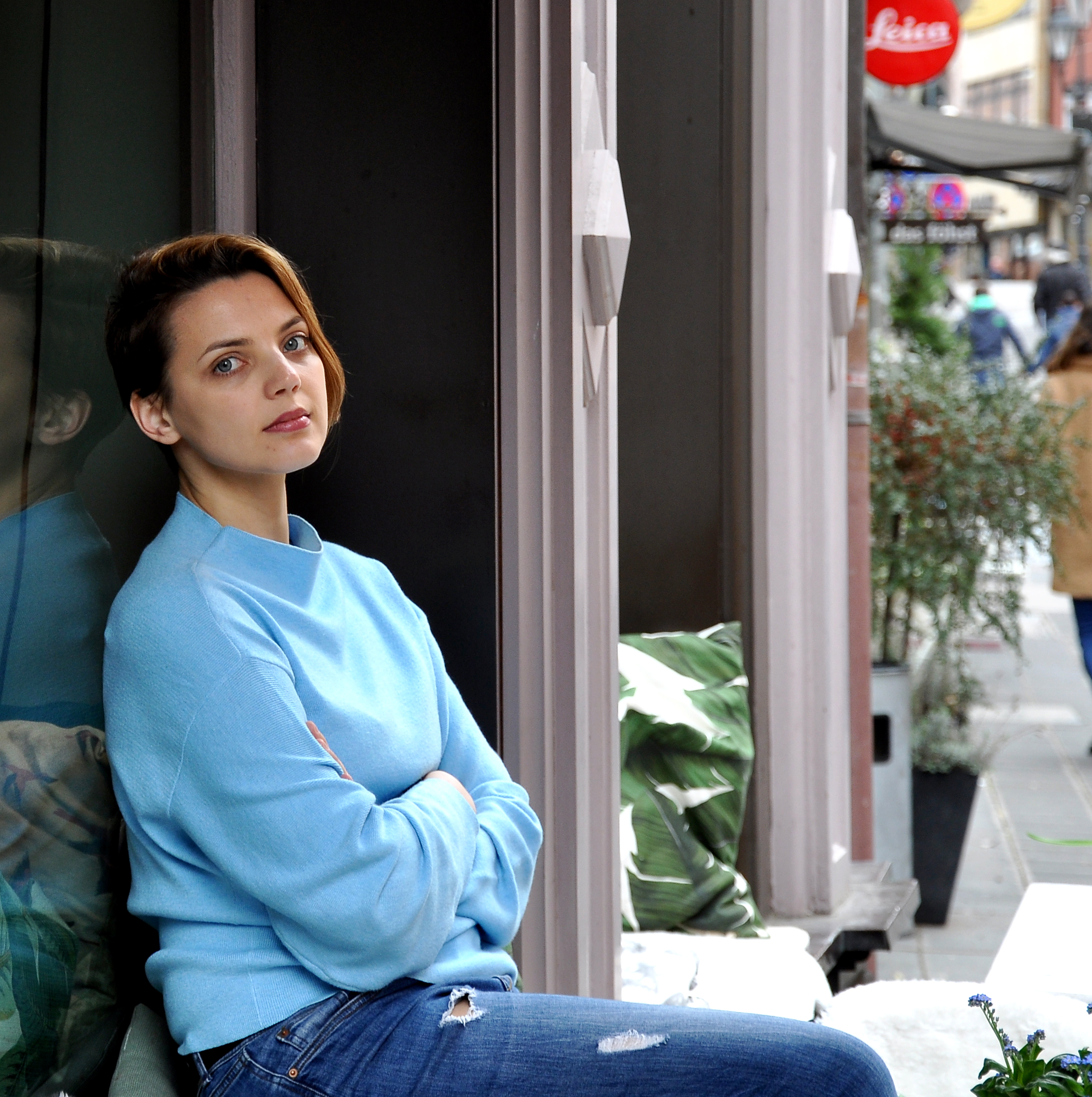
“I have been married to my wife for 8 years now. We used to live in Odessa where I worked as a photographer and she ran a coffee shop. In the Ukraine, we suffered from hostility and our friends and family turned away from us, when they found out about our relationship. One day, our car was set on fire and we decided to go to a safer place to live. In Berlin, we lived with my wife’s uncle before we were sent to a refugee camp in Zirndorf. For us, this was the most horrible place on earth. We had to move all the time and slept in containers, cellars and tents. During that time, we felt safer pretending to be sisters, as we shared small spaces with strangers, Muslims, and conservative people. Despite the difficulties that we have been through, we have never questioned our decision to leave. Our hope for freedom and self-determination have always pushed us to go on. I still find it very sad that Odessa, this beautiful city by the sea, with all its tourists and nice places, couldn’t be a safe home for our family. Here, our daughter is now in the second grade and she is very happy and has many friends. My wife and I also have found people who we already hold close to our hearts. In Nuremberg, we can have a free and safe life and we find many people are open, sweet, and very accommodating. Soon I wish to work as a photographer in this beautiful city and live a peaceful, normal life. Yet, the sea is something that I will always be missing.”
Instagram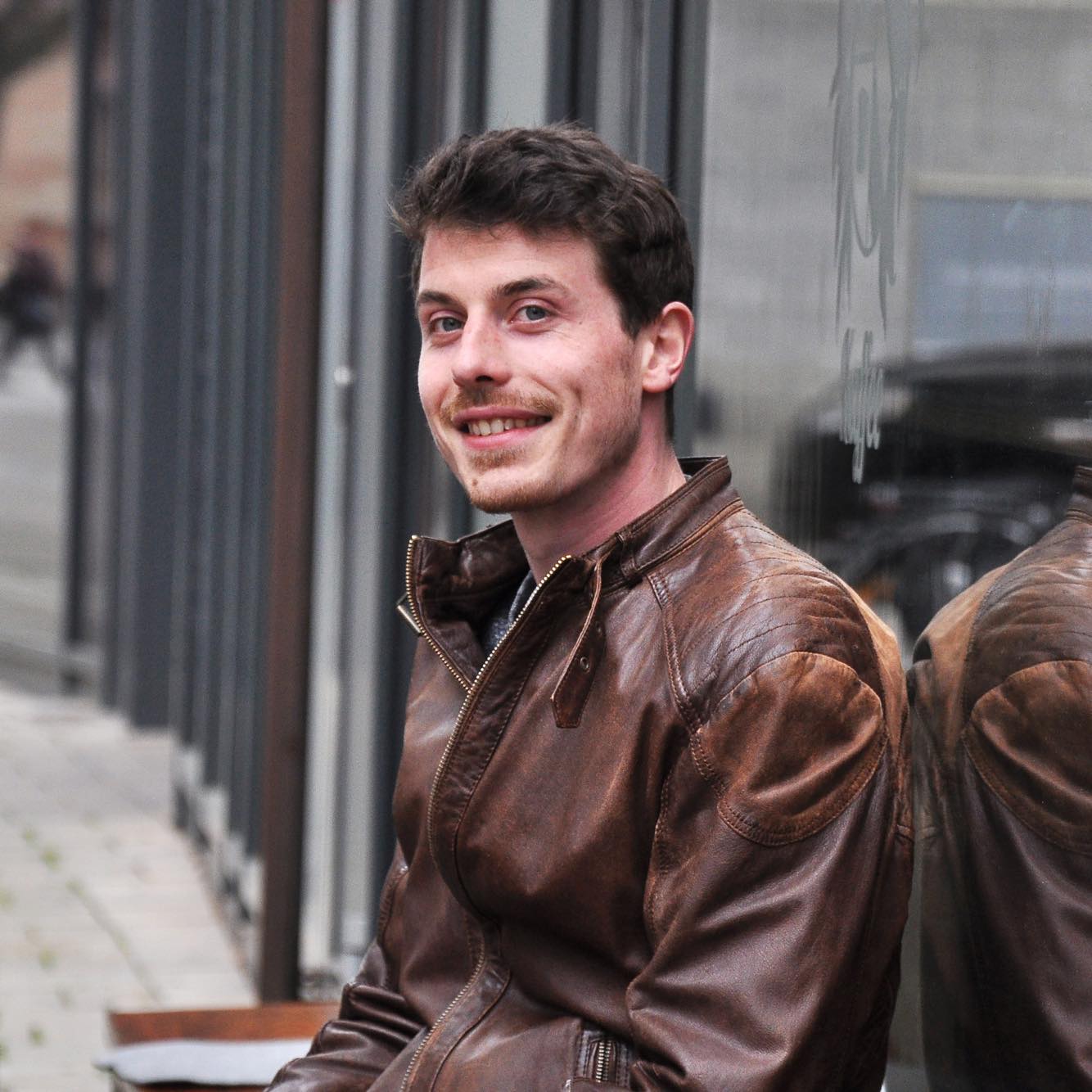
„It is kind of crazy, how the pathways of people cross sometimes. Five years ago, I did a semester abroad in Ireland with the Erasmus program of the European Union. Up until that time, I had only lived with my parents and so I had to stand on my own two feet for the first time. I searched for a room via a Facebook group and through this, I met my girlfriend Hannah, who is Irish. Hannah studies German and during her studies, she had been to Bamberg for quite a long time, where I on the other hand studied economics there. But, we never met. It’s quite funny, as we now are a couple for more than three years. And while, having a long distance relationship can be very challenging, because you don’t see your partner every day and you miss the other person, it can also ensure that the time you do get to spend together is very special. Since we are travelling within the EU, the flights luckily aren’t too expensive and we normally manage to see each other every three to four weeks. We also go on holidays together quite often to visit different countries or places. We also love to take road trips, listen to music in the car and sing along to rock music or even Disney songs. Of course, I want to find my own path after university and make decisions about my career independently, but, one of the biggest goals is to live together in the same country one day – no matter if it’s Ireland, Germany or someplace else.”
Instagram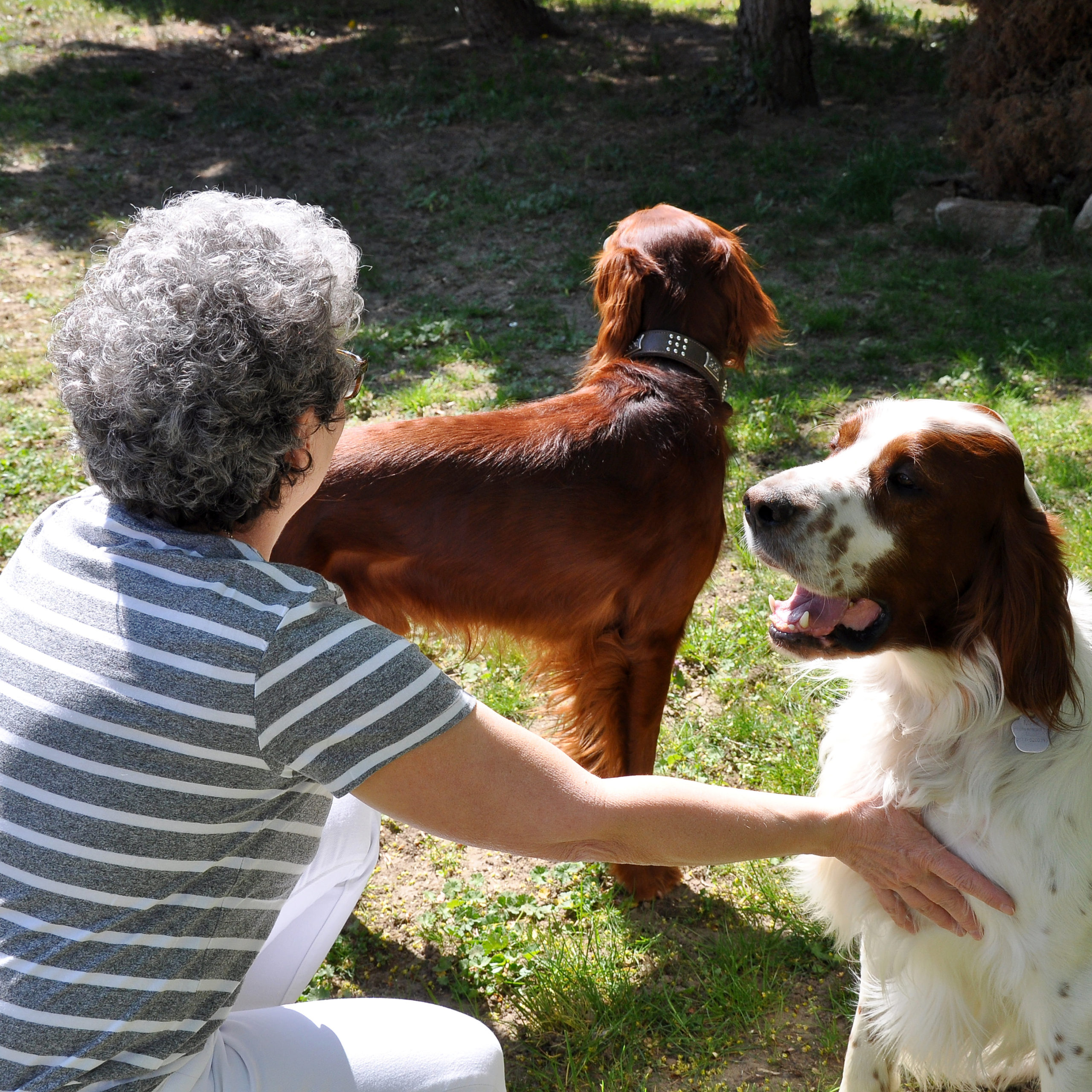
“Growing up in communist Romania under the dictator Ceausescu, my friends and I would always look longingly towards the freedom and opportunities offered in West Germany. As an adult, I worked as an English and German teacher and was the vice headmaster of a school in Sibiu, where the German settlers had shaped the Romanian language and culture since the 12th Century. In 1989, after the fall of Ceausescu, I came to Nuremberg with my two little girls, chasing my teenage dreams of freedom and opportunity. As a single mother, I searched for a job that would support us and applied to dozens of positions. Finally, I had my first job interview as a secretary for the director of a medium-sized business in Nuremberg. The interview was going great until he took a second look at my documents and asked, surprised, “You studied at University? But aren’t you from Romania?” I asked him why he had invited me even though he thought that I wasn’t qualified for the job. He answered that he just wanted to meet “one of these people,” and that he only knew Romanian women as house cleaners or caretakers. He seemed surprised that it was possible to have an intellectual conversation with me. I was not offered the job, citing that I was overqualified for the position.”
Instagram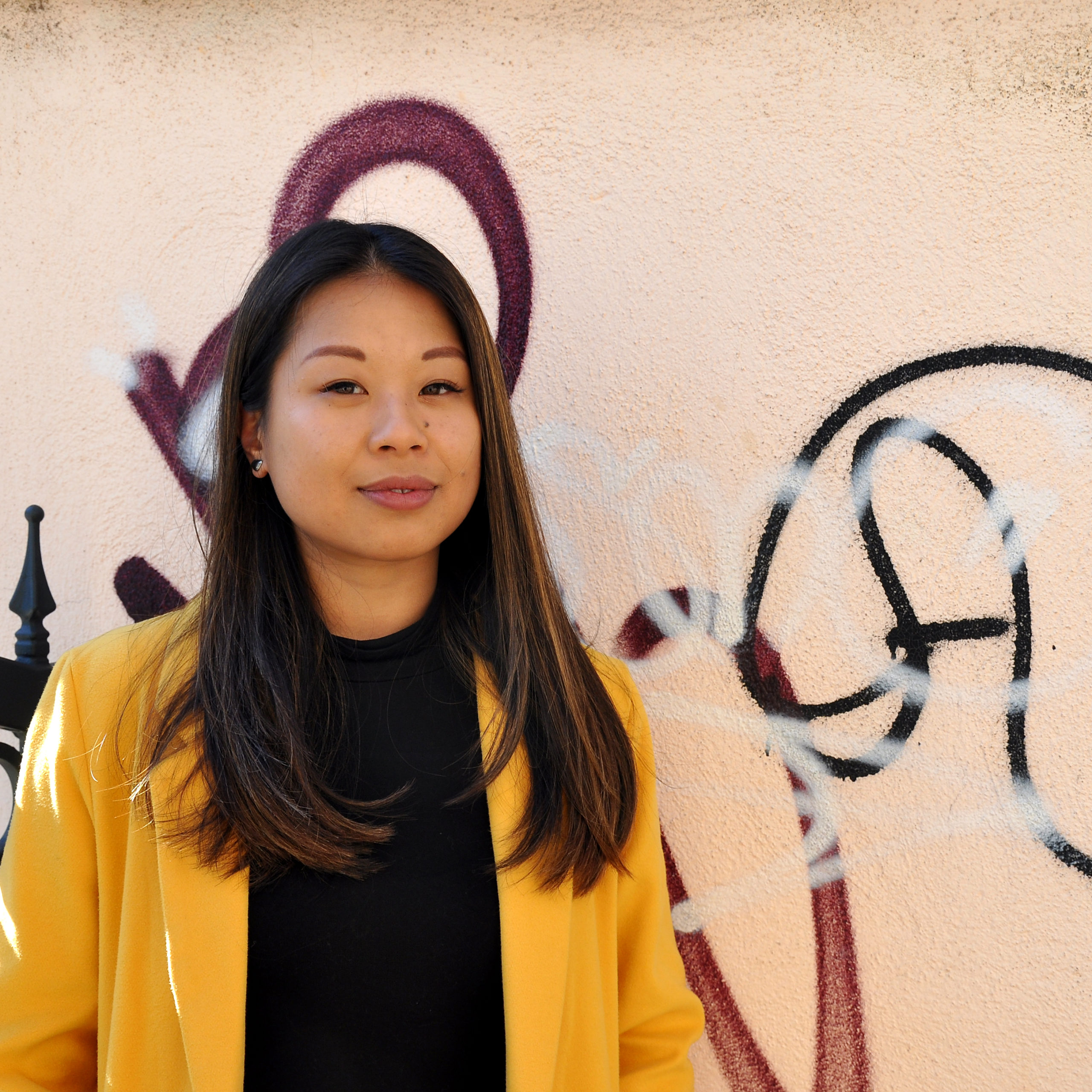
“Gostenhof was not always this hip neighbourhood. When I was five years old, my family and I moved here and at that time, the district was very different. Most of the people, who lived here had very little money, were refugees or had a migrant background. Growing up here I was confronted every day with social issues: girls got pregnant very young and every now and then someone I knew was sent to jail. As a kid, I spent most of my day playing with friends on the street in order to spend less time at home with my abusive mother. When I was a teenager, I would hang around all day with my friends in Jamnitzer Park, where alcohol and drugs where often consumed right next to us. Once we found an inanimate body in the trees there – I think he was dead. Life was hard and I felt that I was predisposed to follow what was in front of me. I couldn’t afford normal things, like going to a coffee shop. When I was 13, I ran away from home and was put into a children’s home and later a shared home. Here, I had people who cared for me. In this quiet environment, I could concentrate on school and my career. Today, I am a lawyer and I often return to Gostenhof to the palace of justice on Fürther Straße. Many people, who hear my story see it as a happy ending or they try to romanticize what happened to me. But I didn’t choose this life. I had to be strong and look after myself since I was a child. Maybe that made me stronger, but at what price? Now when I see all the happy moms in Gostenhof drinking their cappuccino in the sun, I am on the one hand happy, that this is possible for more people now but on the other hand, I pity that time lets people forget how hard it was to grow up here.”
Instagram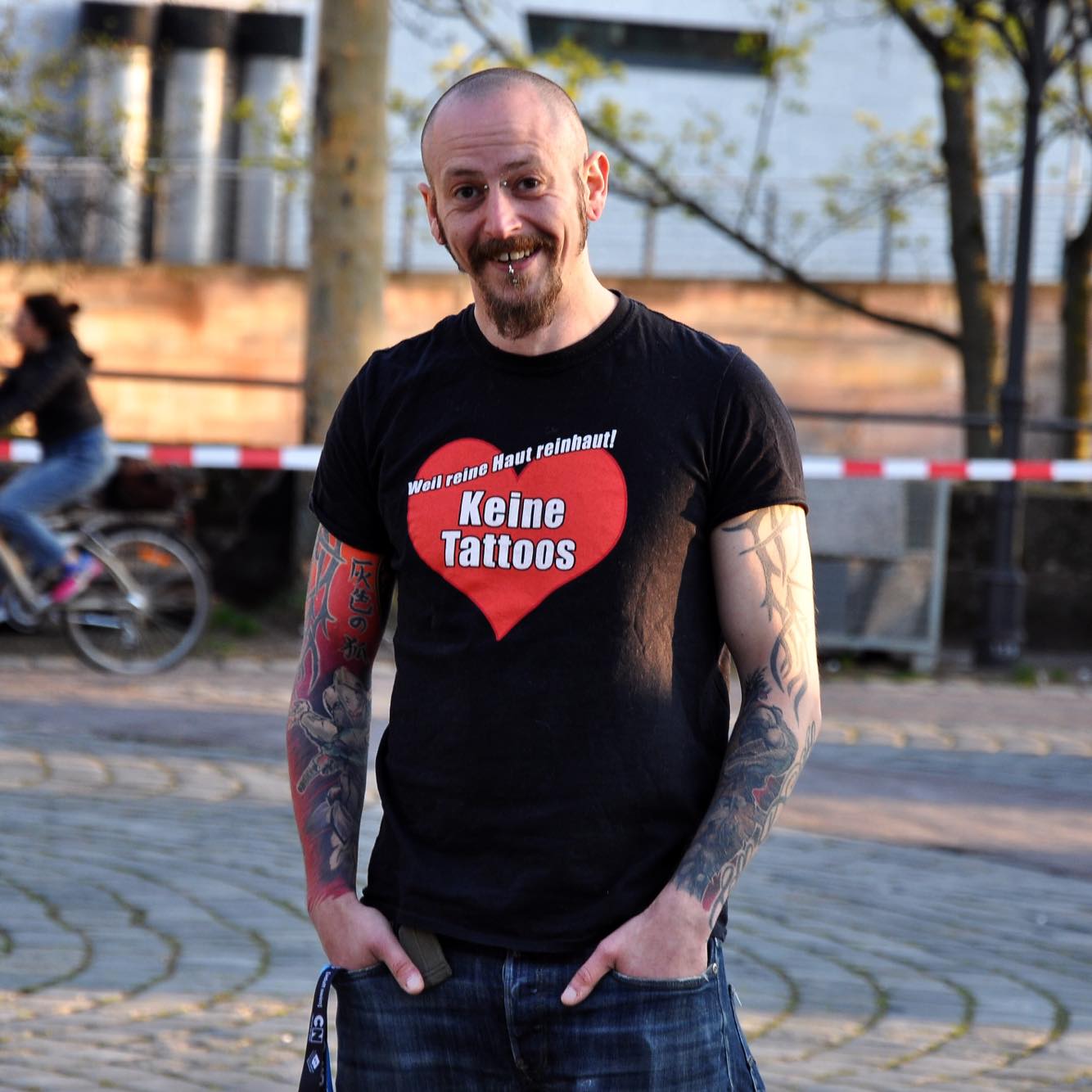
“People are finally starting to realize that not every tattooed person inevitably went to prison or was a sailor. I’m heavily tattooed, pierced, I’m a singer in a metal band and I’m also into martial arts. What surprises most people when they get to know me is that I’d rather spend time cuddling my cats than robbing a gas station. Prejudices make me sick, but you can never completely avoid them – for example, when I tell people about my job. I’ve worked in the games industry for quite a long time now. Before becoming the program director for one of Europe’s biggest game developer conferences, I was the editor-in-chief for a B2B magazine. Gaming has always been my passion, since I was a kid. And while it is one of the biggest industries worldwide, games for many people are still seen as a glorification of violence or simply childish. However, they can be so much more! Games can help you develop socially critical and tactical thinking. They are highly immersive, many are serious pieces of art, and they more than often trigger a broad variety of emotions. An exciting game makes me laugh, cry, or shudder more intensely than many movies do. When I play, I’m not just consuming. I’m pro-actively diving into virtual worlds, exploring uncharted territories and mysterious locations. I solve riddles, I overcome numerous challenges and sometimes I even have to face serious moral dilemmas: Could I survive in a war scenario? With only one ration left, who gets to eat, and who doesn’t? Movies don’t force you to make those decisions – games do, and it can feel pretty devastating, even though it’s just a fictional scenario. Certainly not every game is meant for every person of every age, but neither are movies or books. Parents and adults should take more interest when it comes to content instead of leaving that responsibility to other authorities – it’s that type of ignorance that really makes me cringe. Besides, games are not just for teenagers and kids anymore. Who knows, maybe some parents will even find a game that they love to play!”
Instagram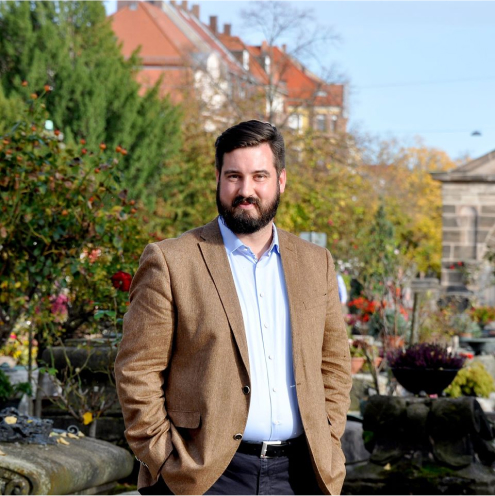
“Since moving to the north of Nuremberg a few years ago, the St. Johannisfriedhof has fascinated me, not only as a place of mourning, but also as a place of aesthetics and culture. The question of how we deal with death and our ancestors is, for me, a very important aspect of our culture and identity. It is certainly unusual for me to deal with death so intensely at the age of 35. With the Nuremberg Epitaphia Foundation, I am committed to the preservation and care of this unique place where people like Dürer, Feuerbach and Pirckheimer were buried. Of course, as a historian, I ask myself in particular: what have these important personalities contributed to the city that makes Nuremberg what it is today? What else can this place tell us? In addition to death and sadness, there is also so much joy and positivity here. There are baptisms and weddings in the church, and I also married my husband here. With laying tombstones, the ornate epitaphs, the carefully cultivated flower bowls and blooming roses, the St. Johannis graveyard is simply a beautiful place. In Nuremberg you are typically very modest, does not bother a lot about the special features of this city. Other cities would boast about such an extraordinary place. I think that the Capital of Culture is a great opportunity to show all people of Nuremberg as well as visitors, what is great here and what makes us unique. From our past, we can also create something new that we have never dared to do. At my age, it’s chic to strive for modernity. Often, however, things that initially seem outdated and old are not so old-fashioned and have great significance for the present and the future. ”
Instagram